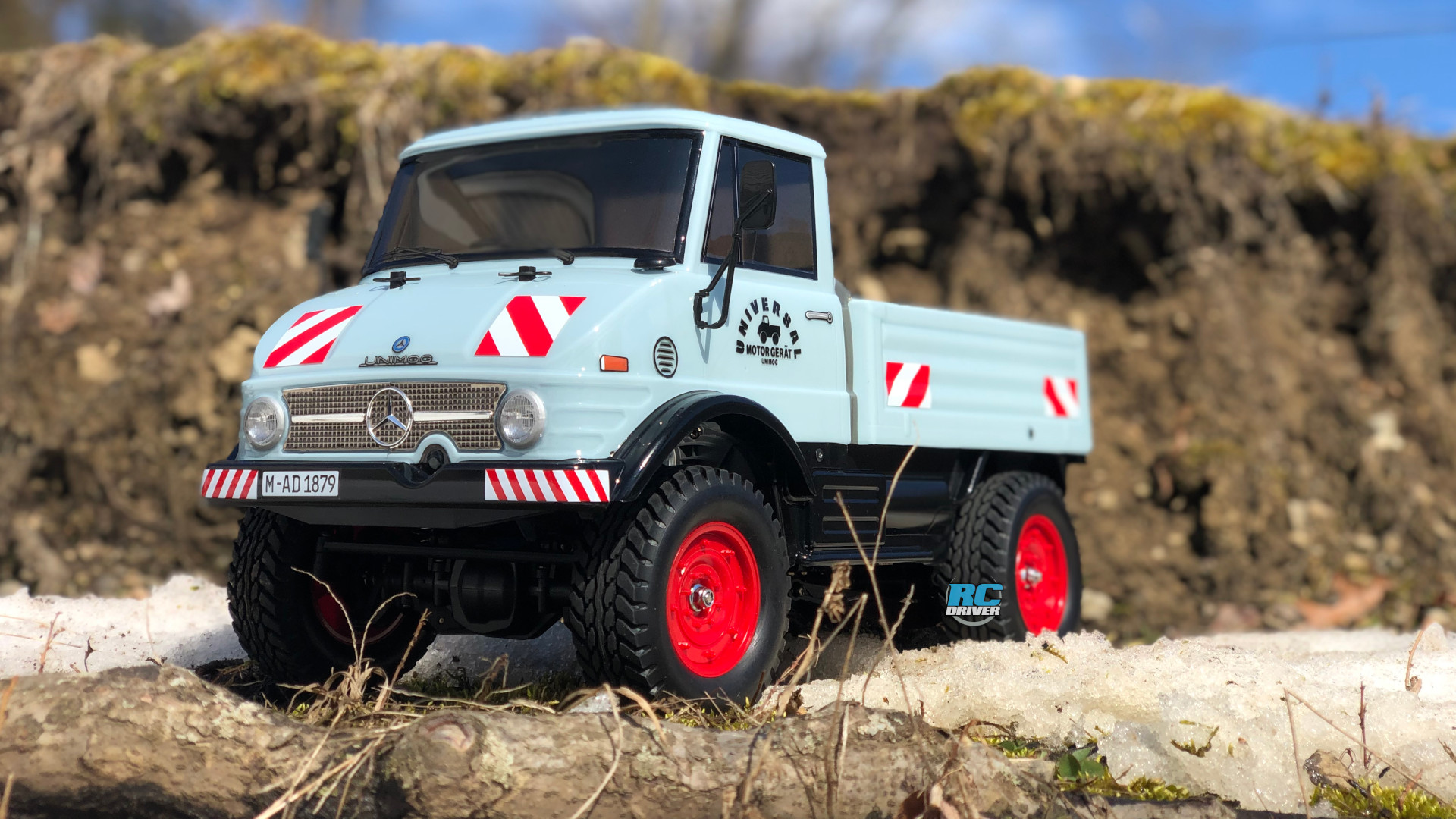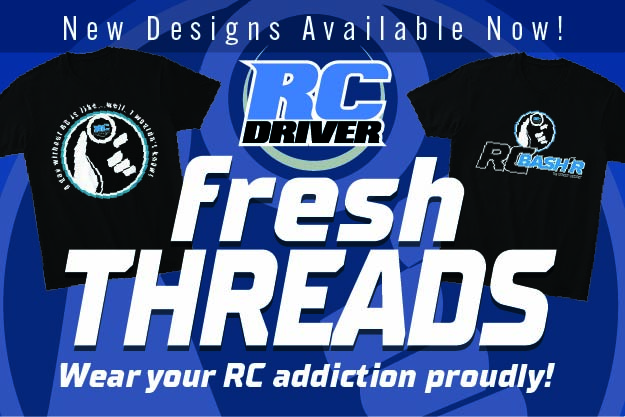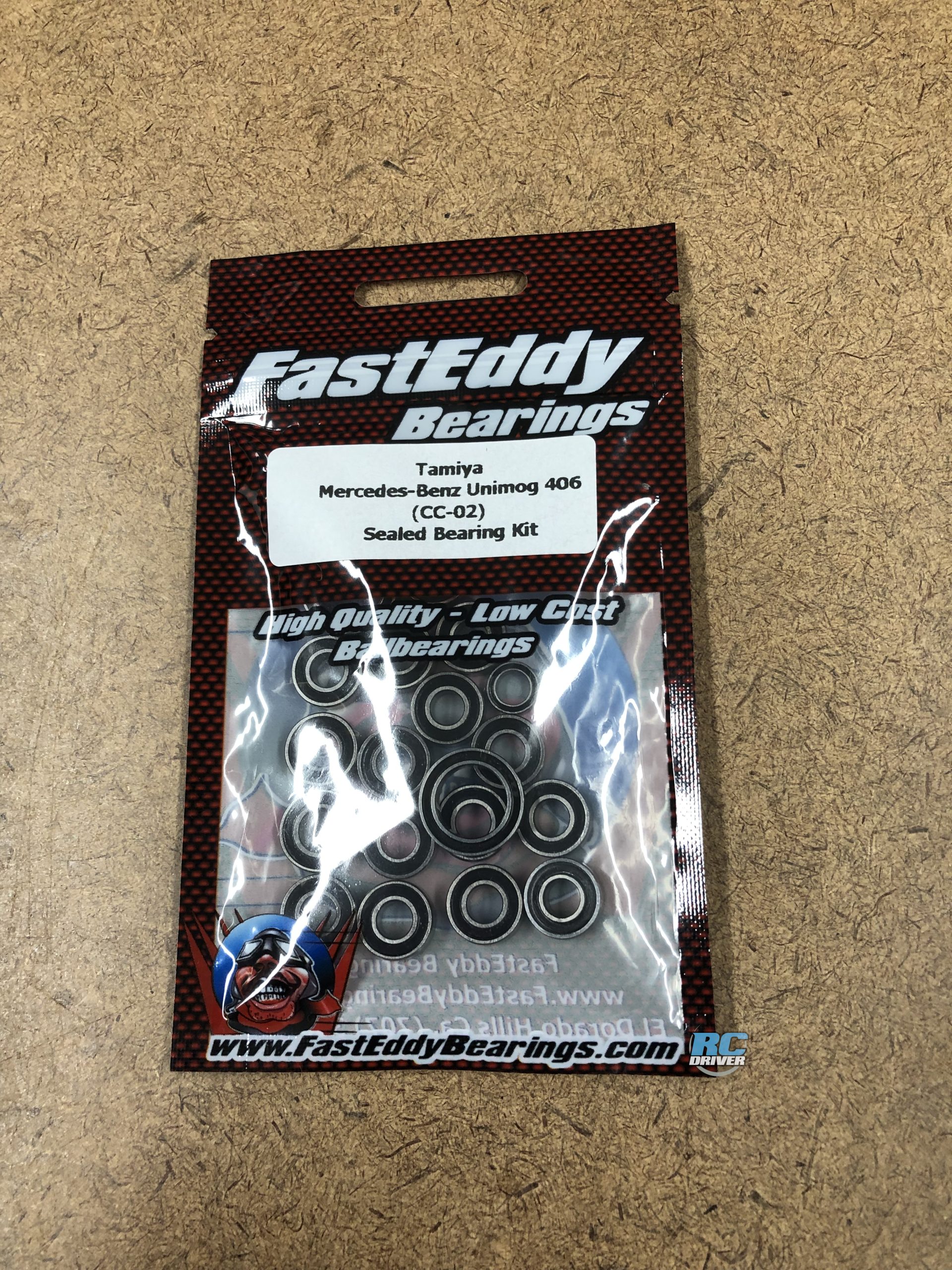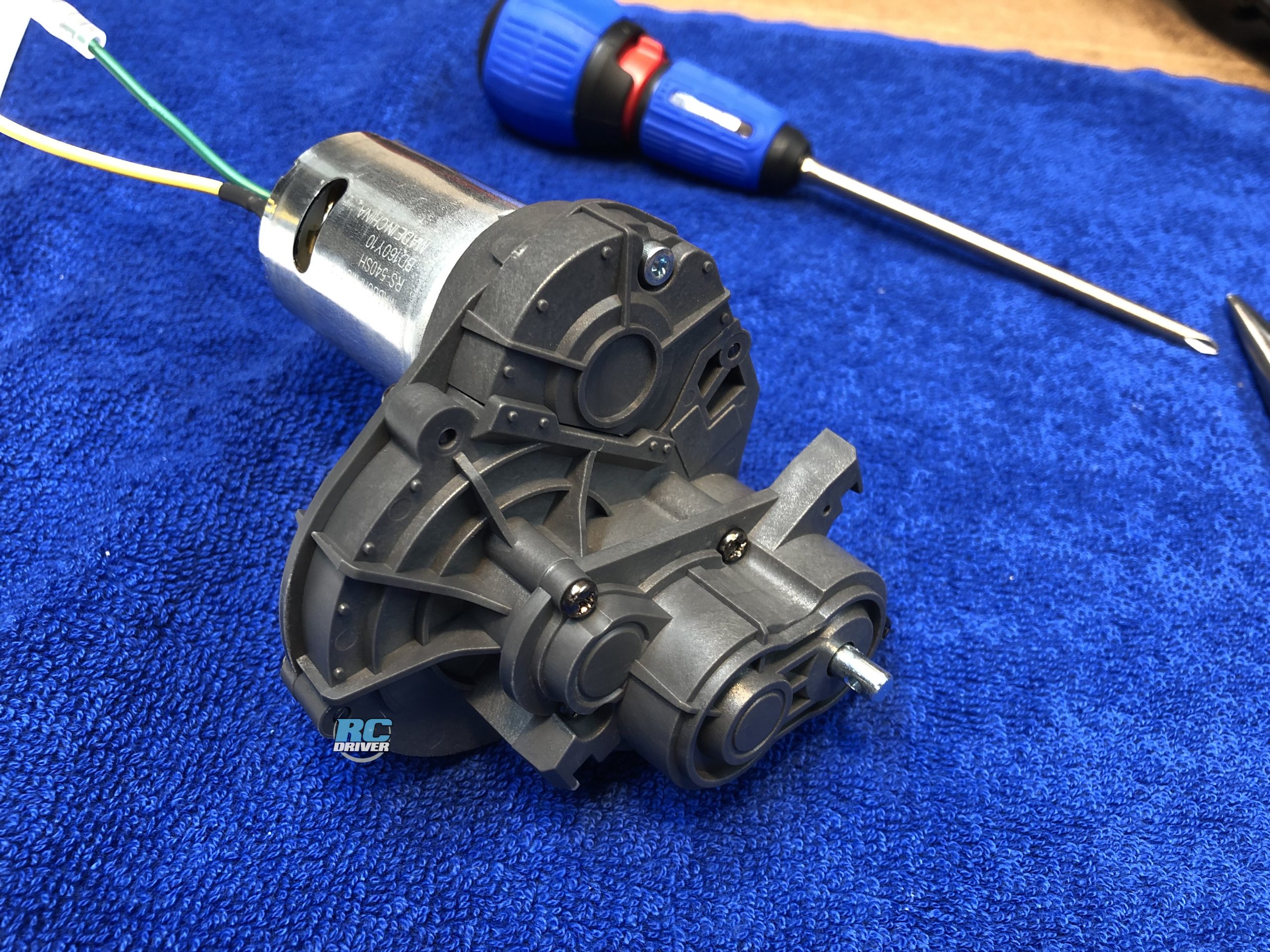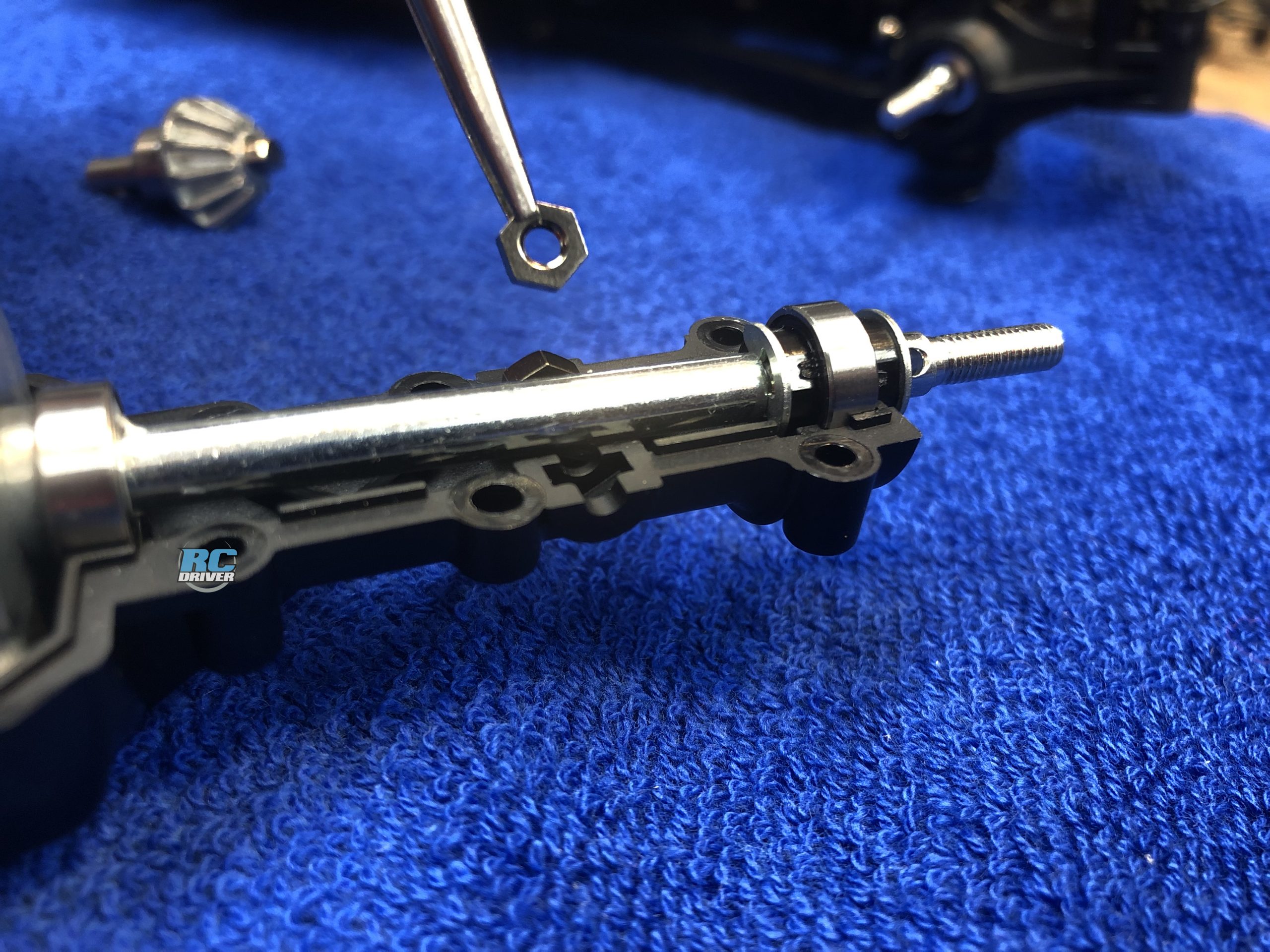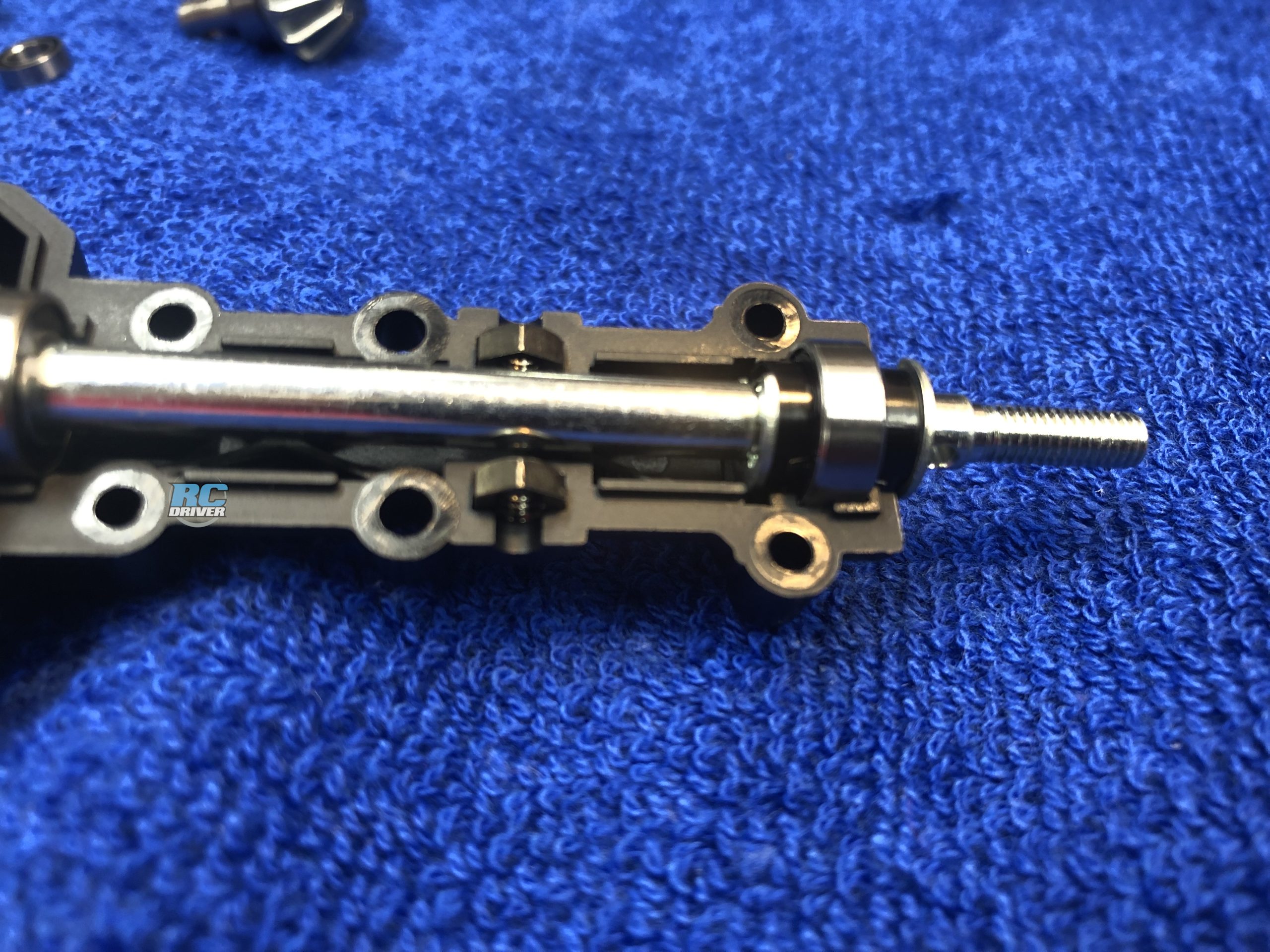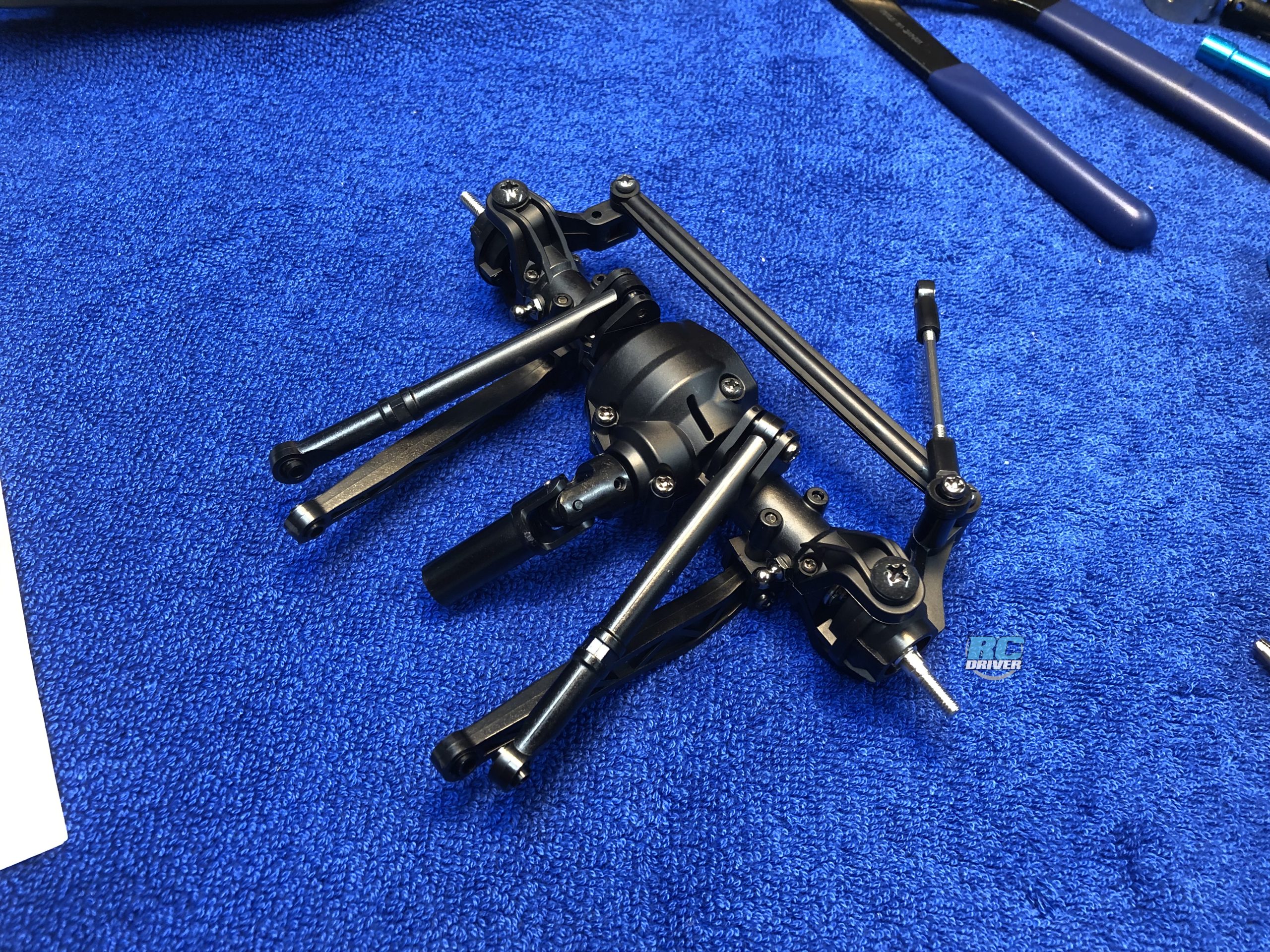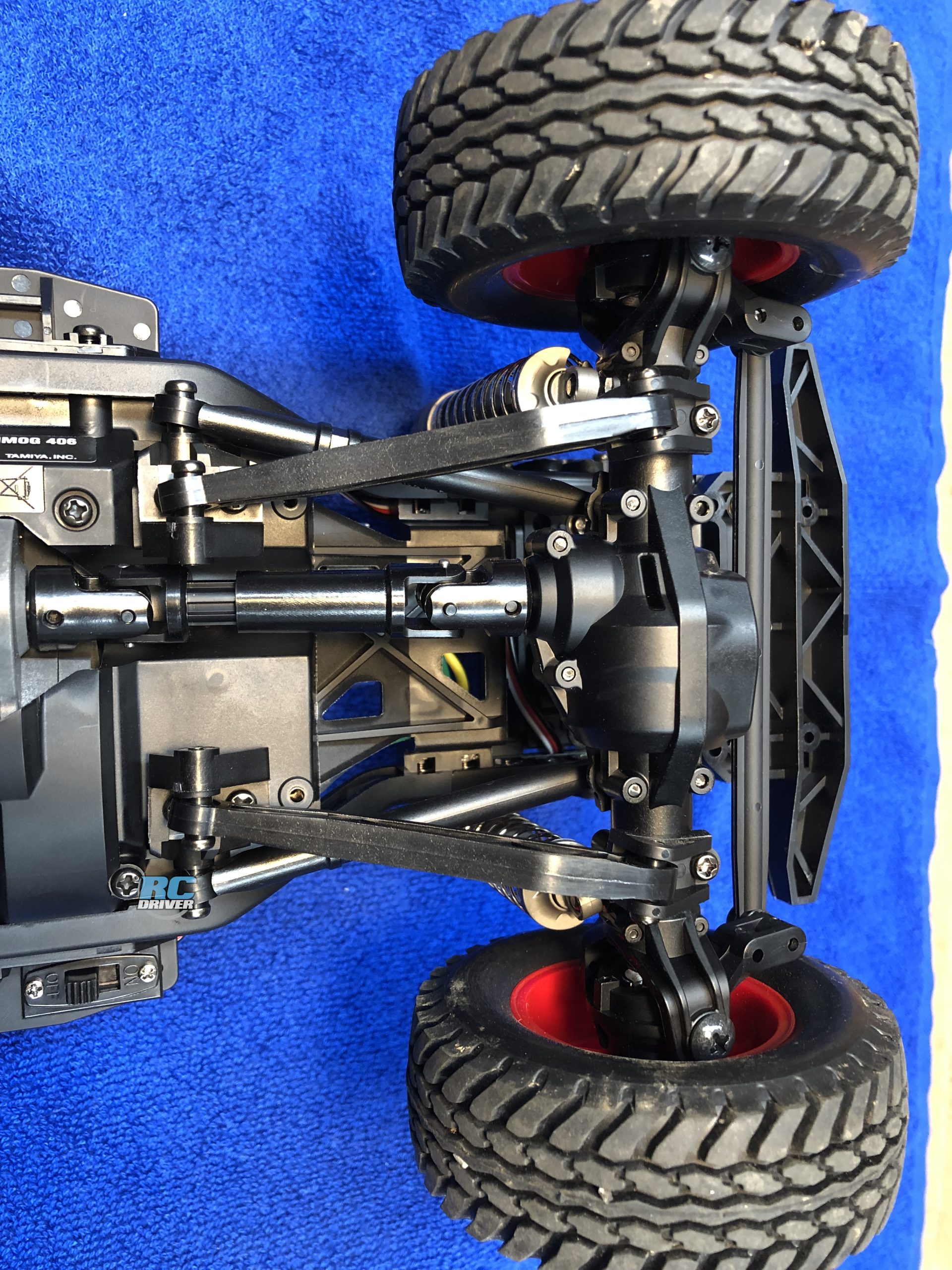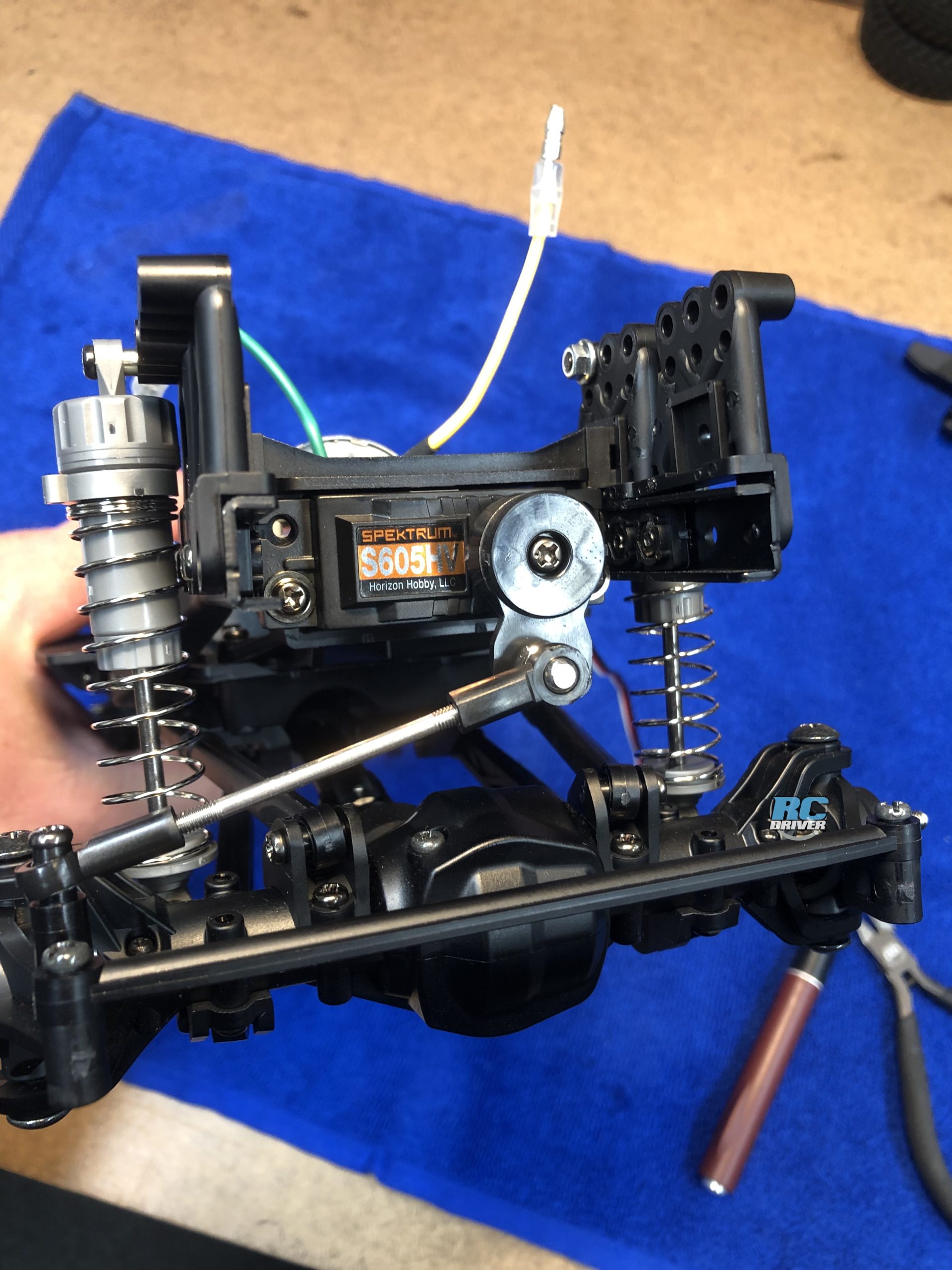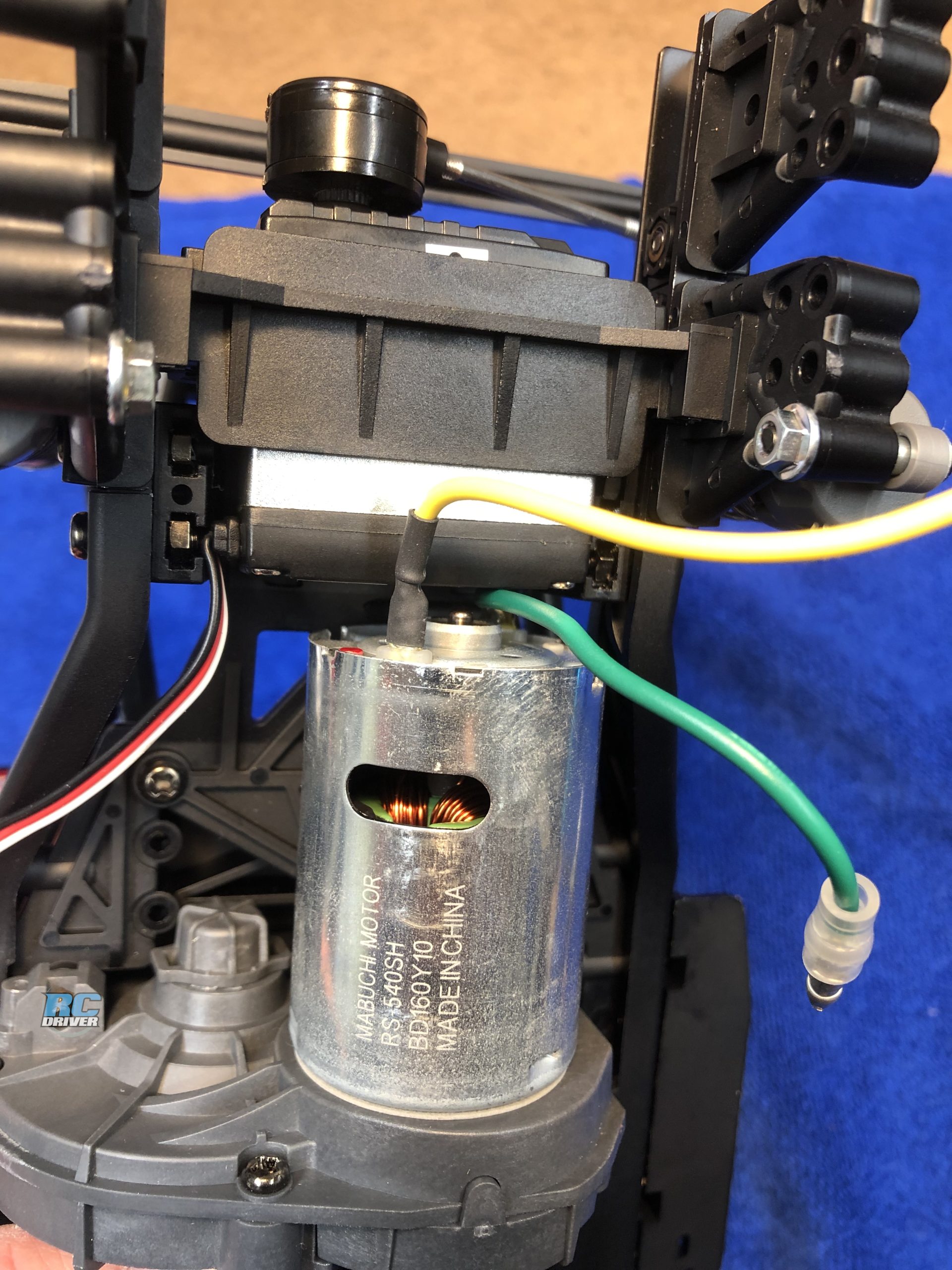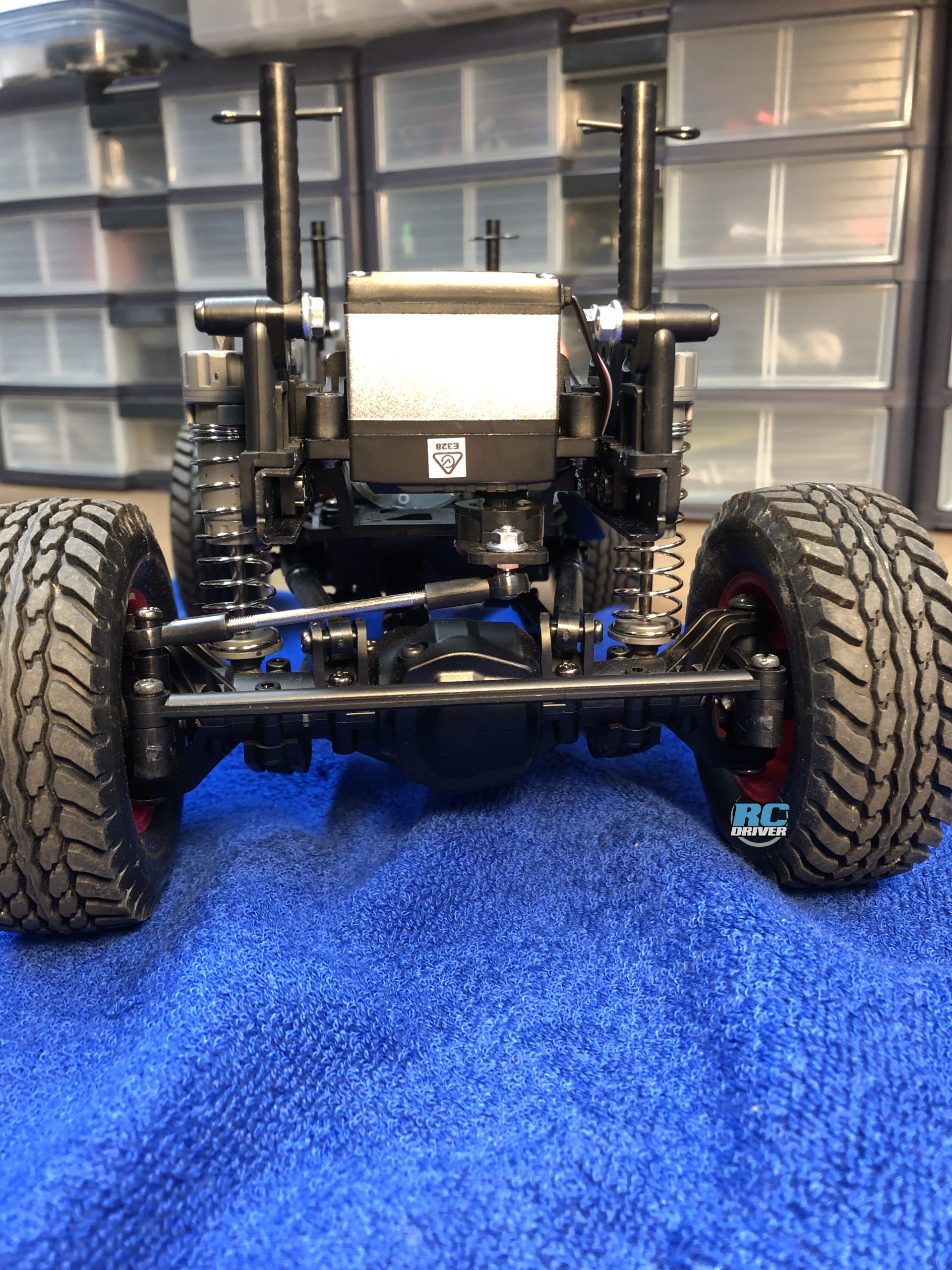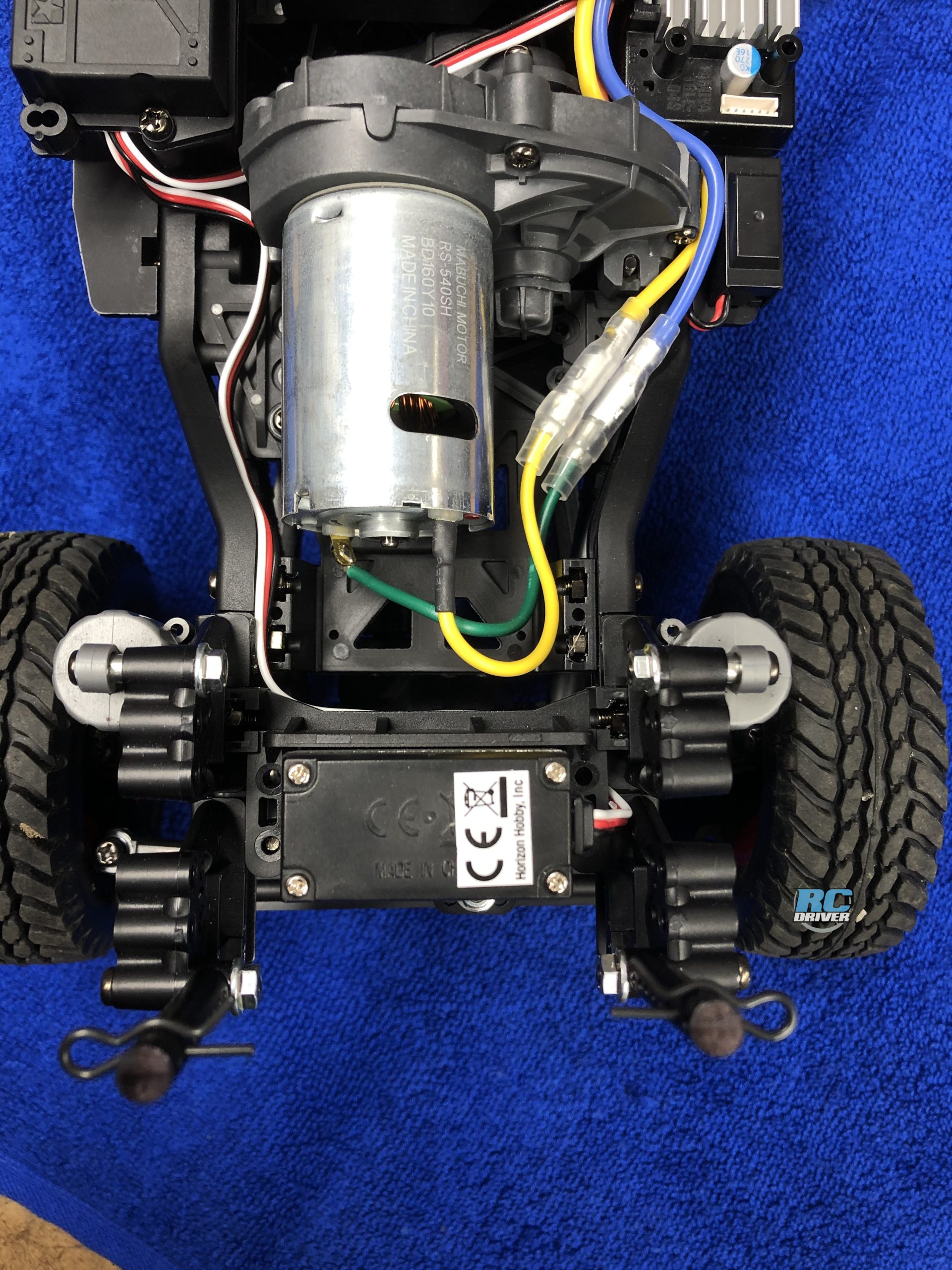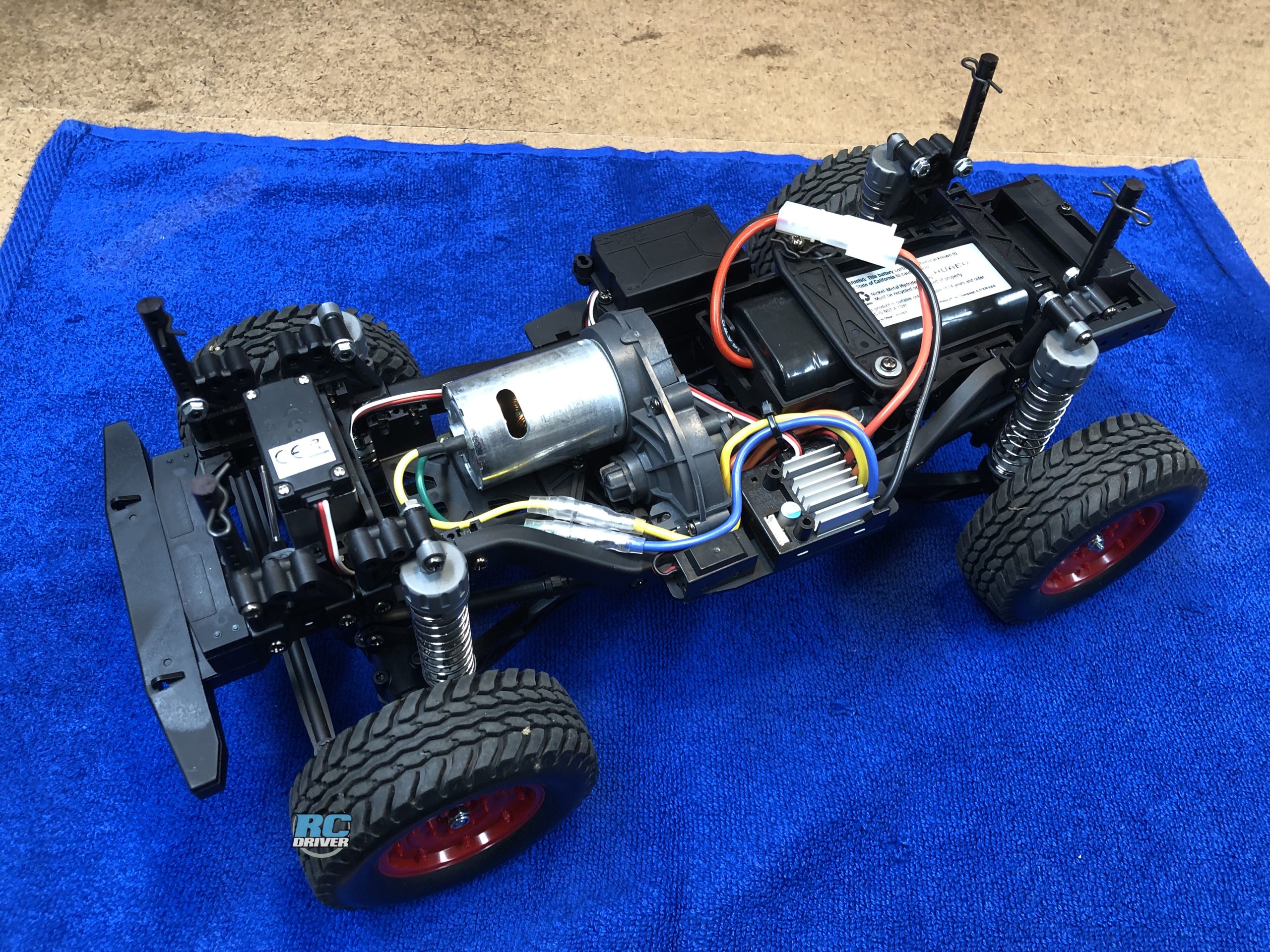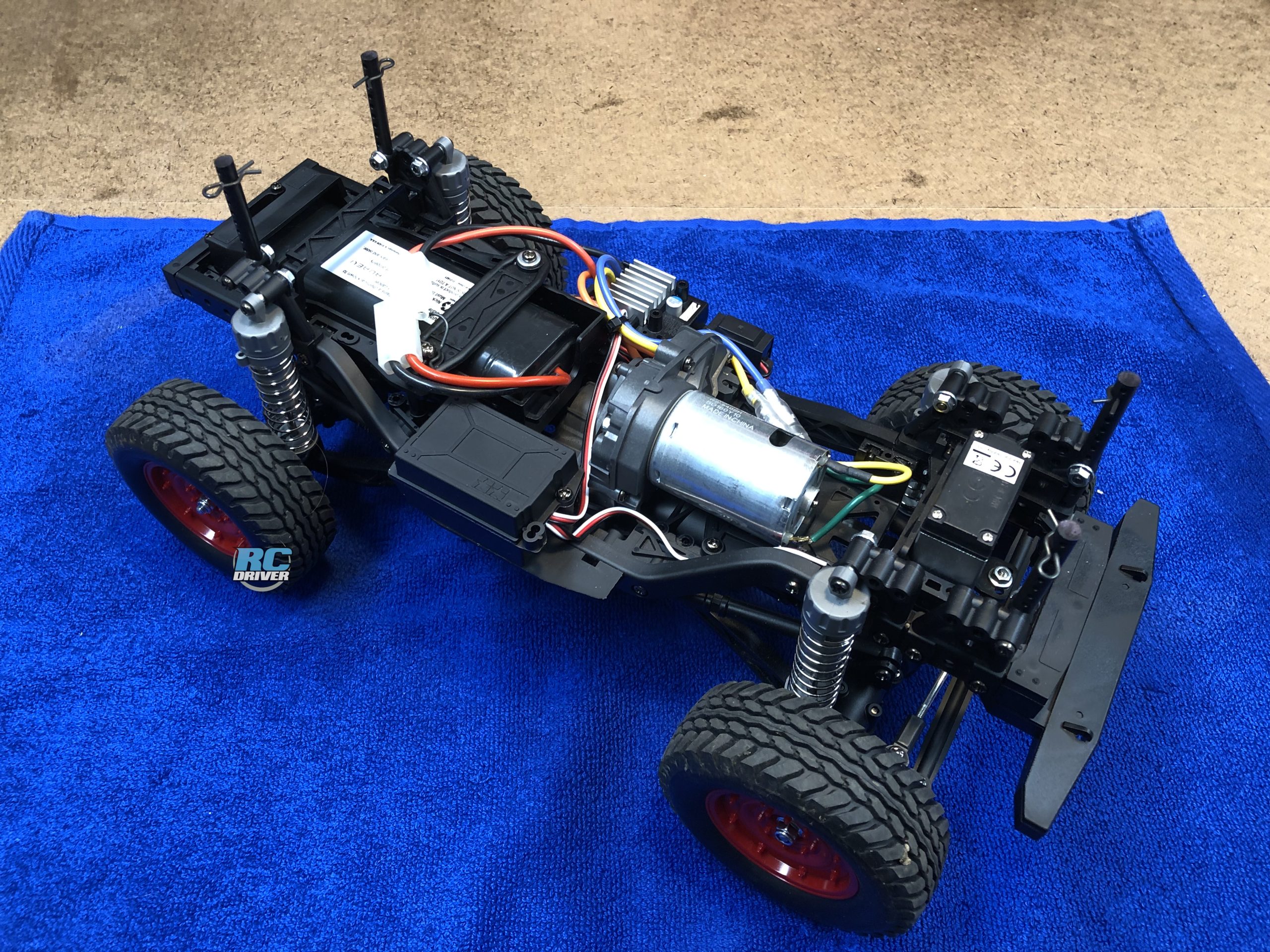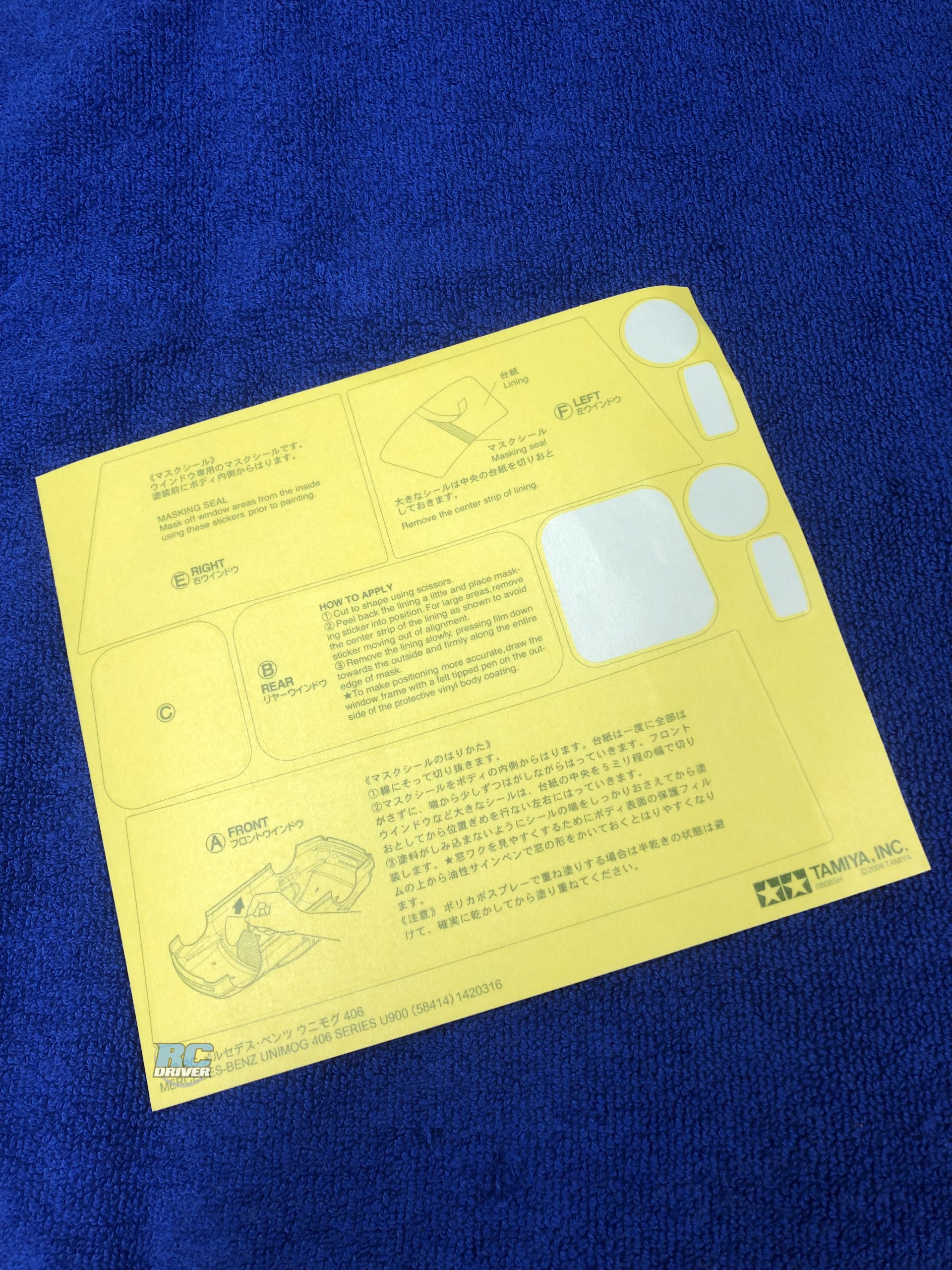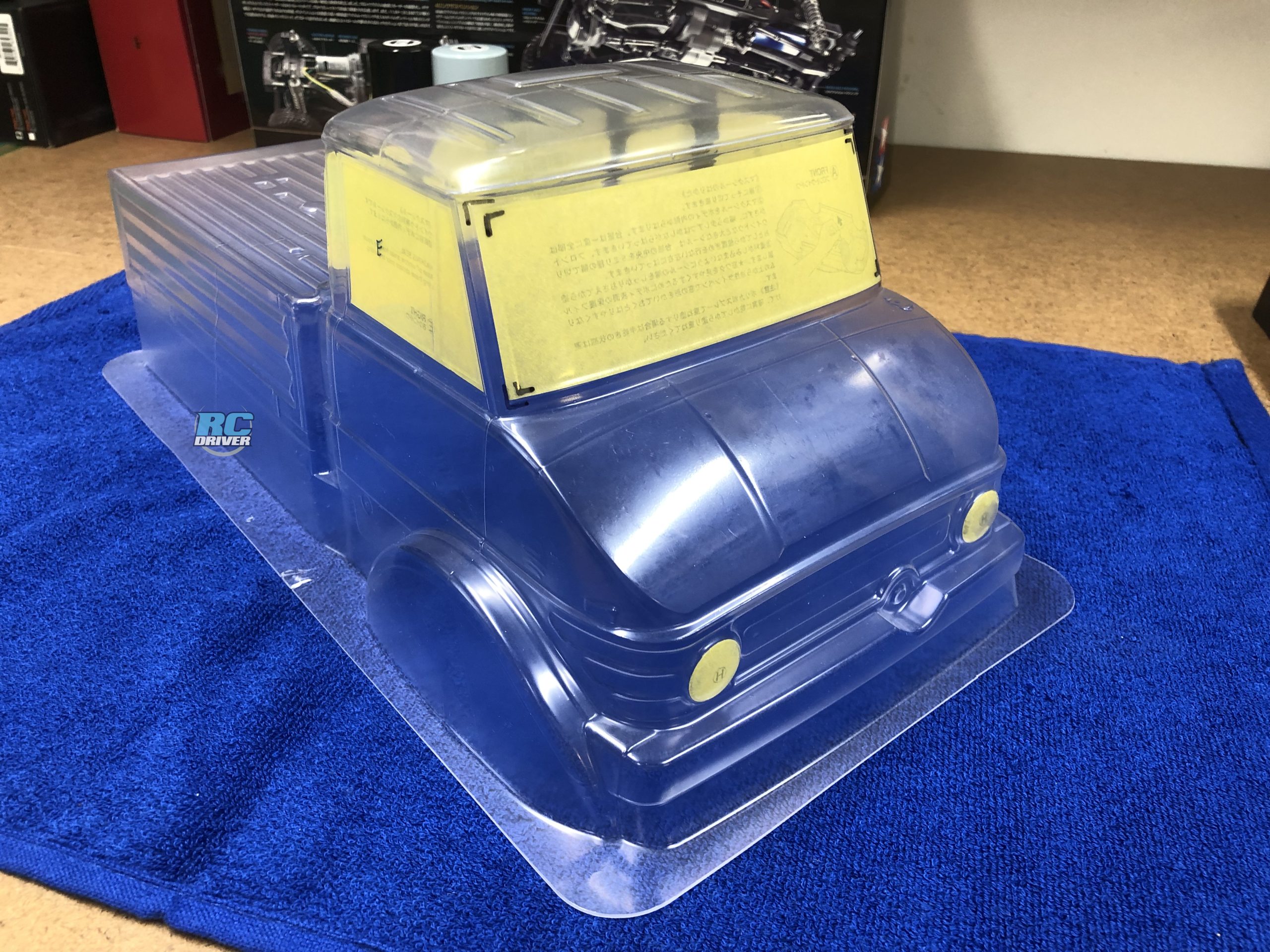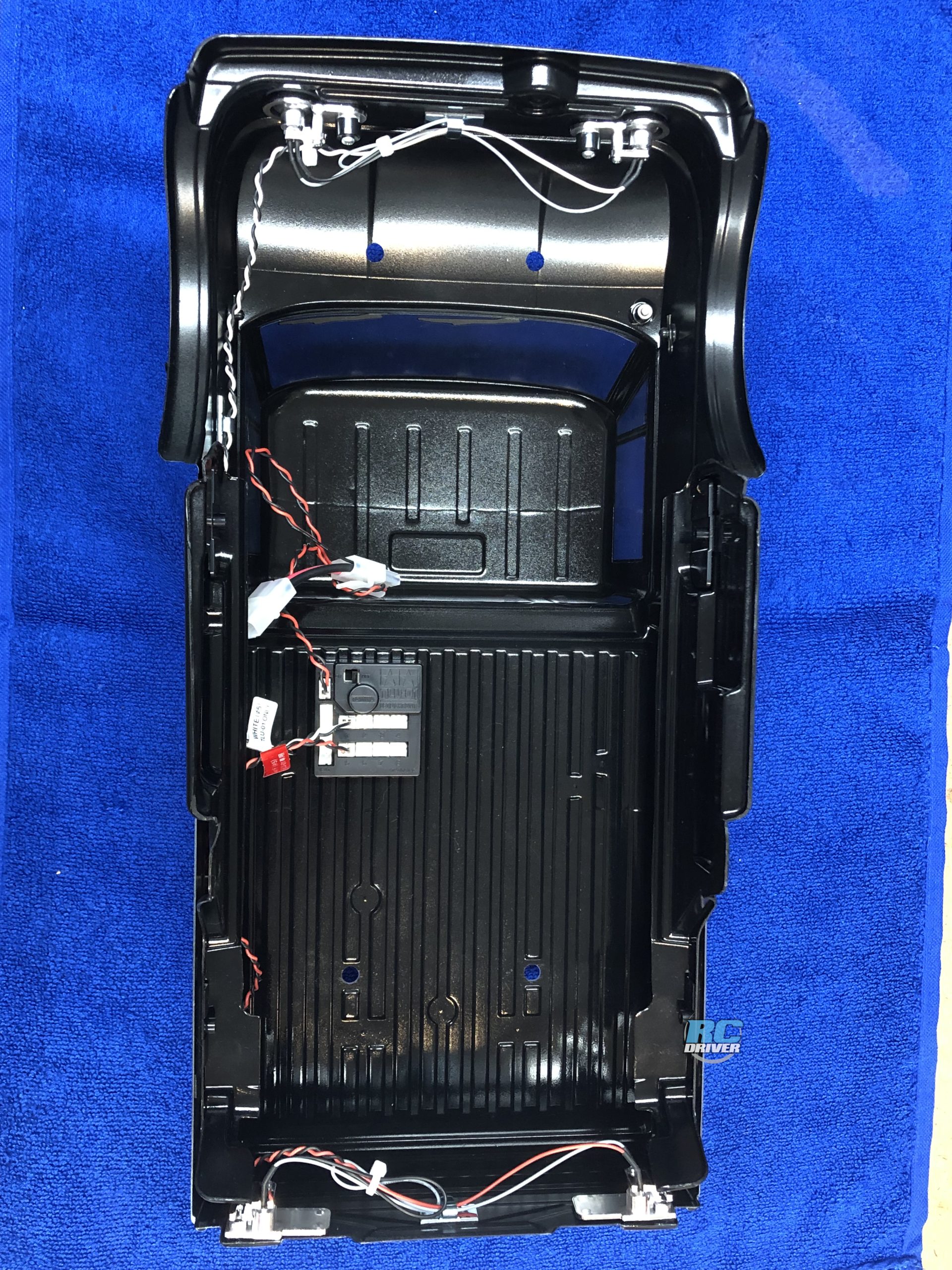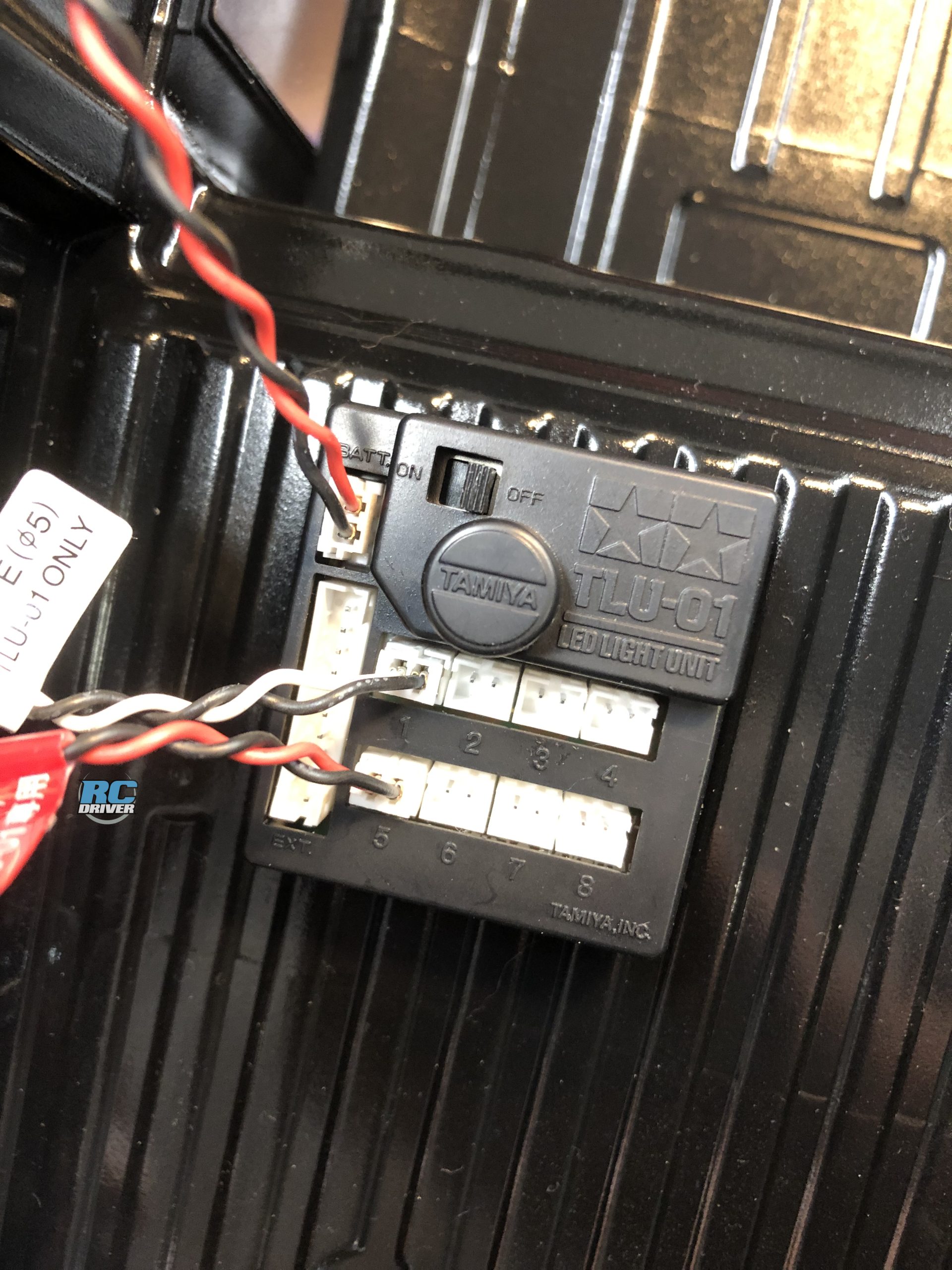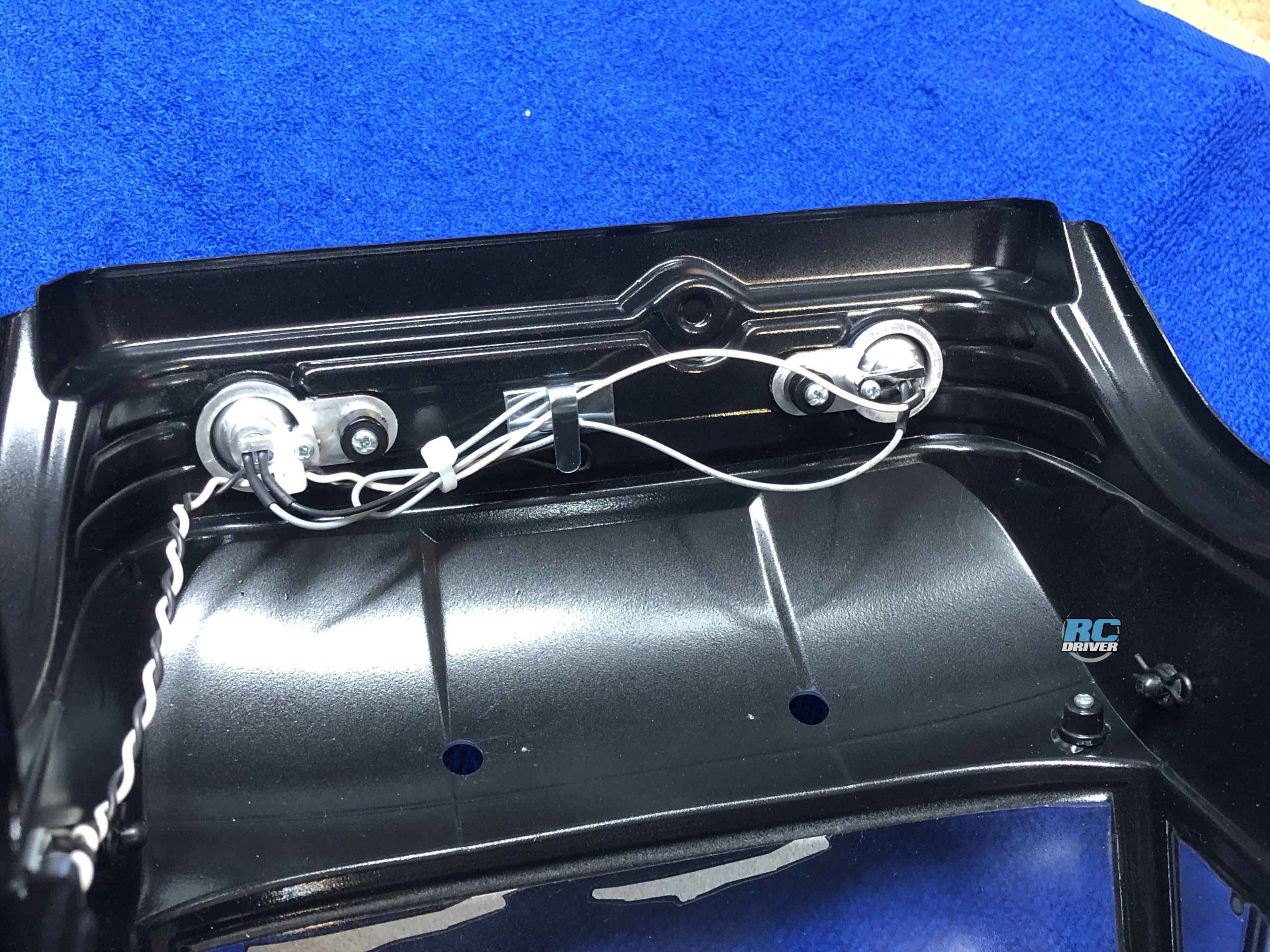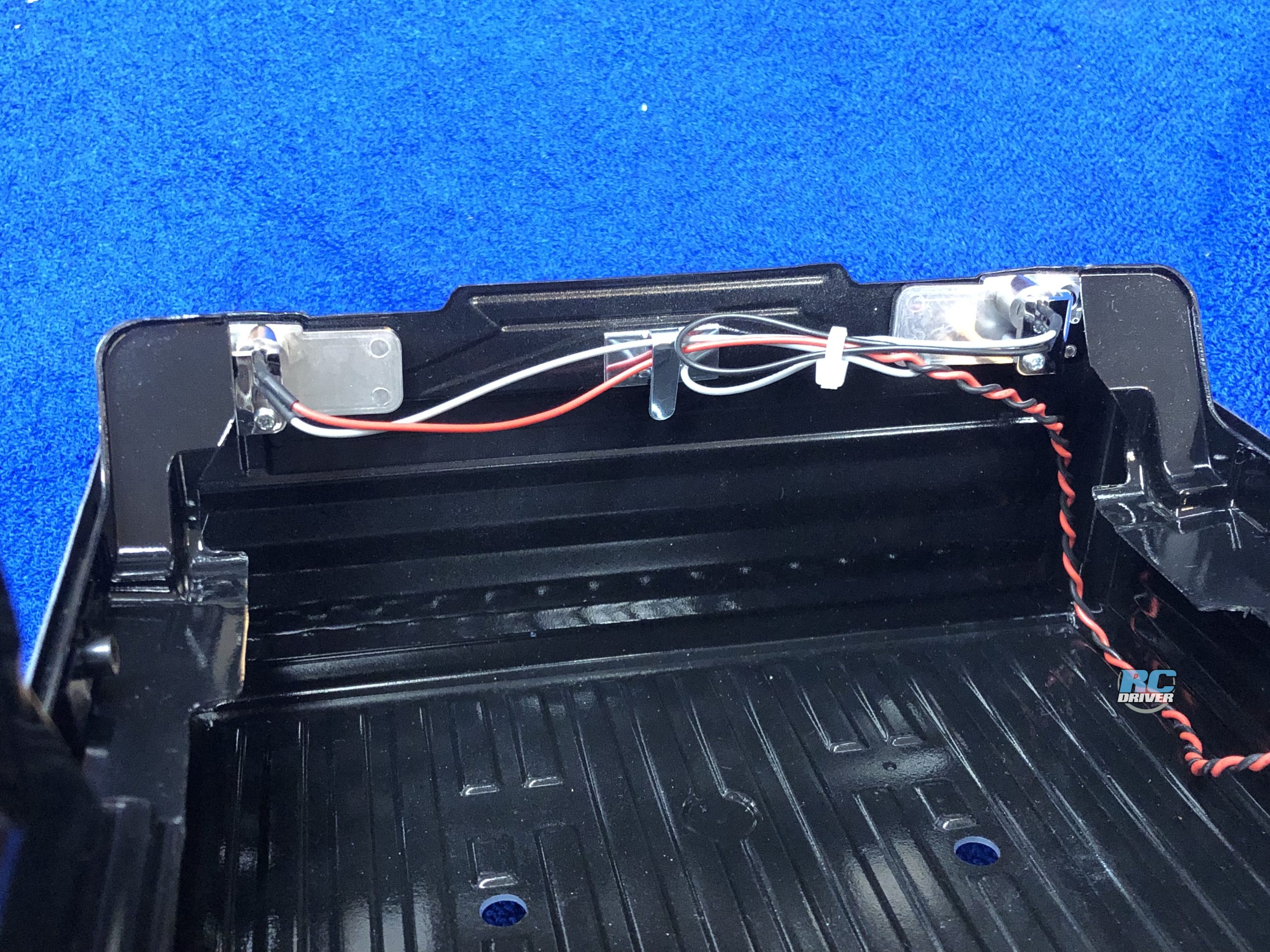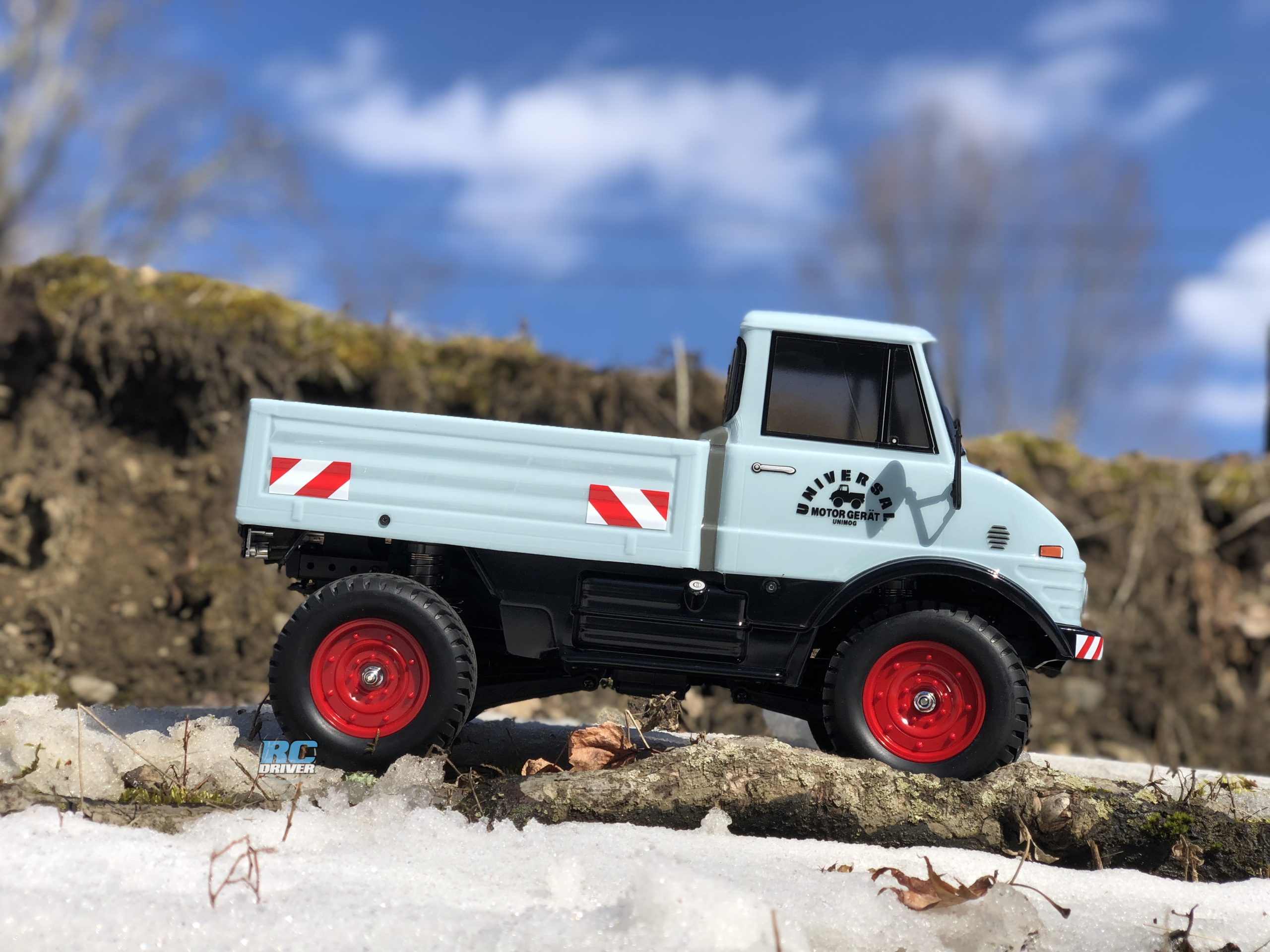Before you is one of the cool iterations of Tamiya’s cross country platform the CC-02 mated with the iconic Mercedes-Benz Unimog 406 Series U900 body. The cross country platform has been a well utilized chassis by Tamiya for nearly 30 years and has found its way into countless different kits featuring a plethora of realistic off-road bodies. The original was named the CC-01 which had a solid rear axle and an independent front suspension complete with molded wheel wells which gave it a great scale appearance. Then in 2019, Tamiya overhauled the cross county chassis and released the all-new CC-02. With this new chassis, Tamiya has partially moved away from a scale appearing chassis and decided to focus more on off-road four-wheel-drive capability. To date there are five different trucks offered on this new chassis: the Mercedes-Benz G500, the 1990 Land Rover Defender 90, the Ford Bronco 2021, Toyota Land Cruiser 40 and the Tamiya CC-02 Mercedes-Benz Unimog 406 Series U900 that we are reviewing here.
RADIO SYSTEM AND STEERING SERVO
For this build we went with the super reliable and very affordable Spektrum SLT3 3-channel transmitter with the SLR300 receiver. The CC-02 only needs a 2-chanel radio system, but we like having the extra channel if we decide to add any special features in the future. For the steering department, a Spektrum S605 standard metal center case waterproof servo was called into action. At 6V it is able to produce 161 oz.-in. of torque which will do nicely for the Unimog.
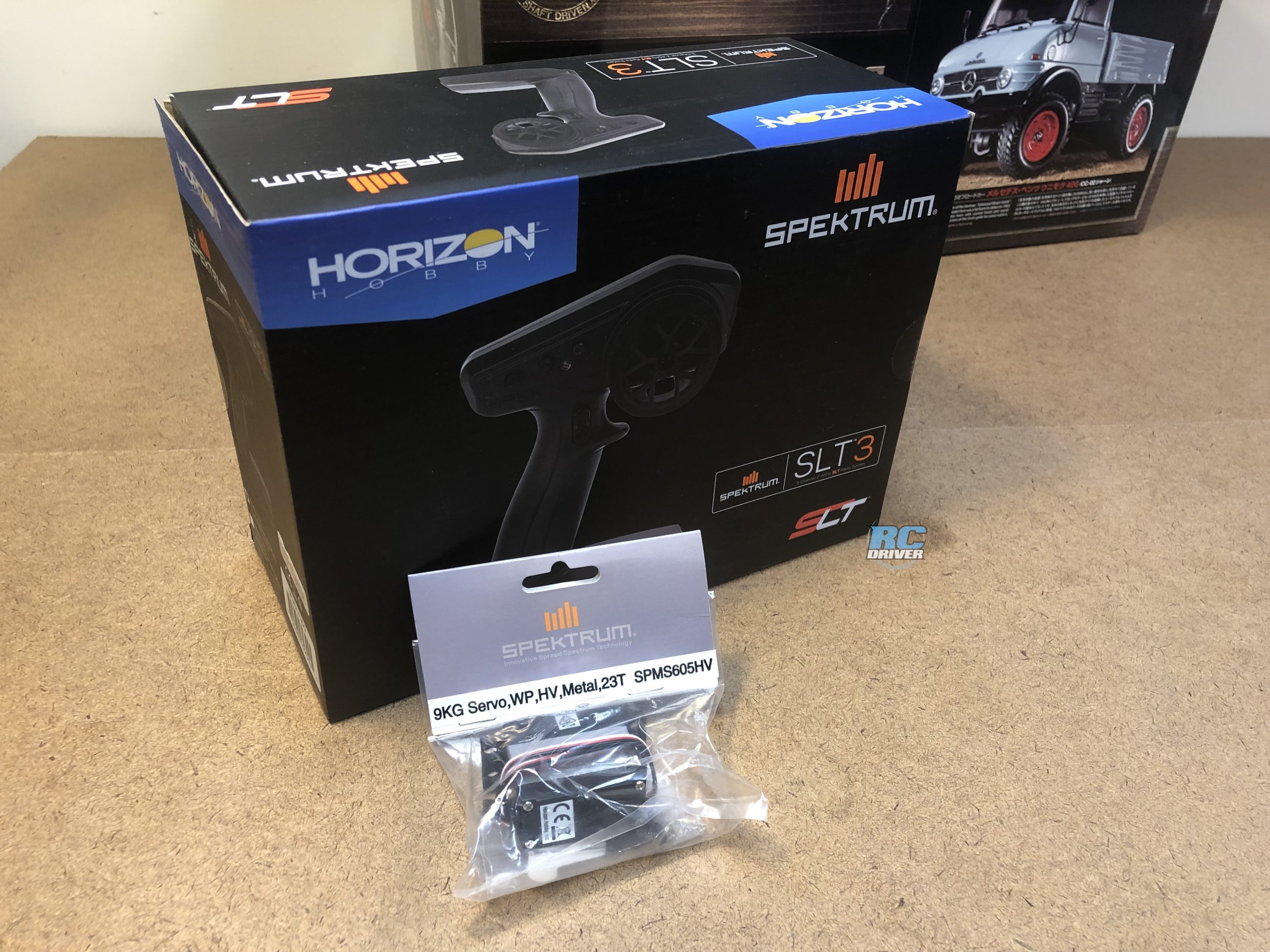
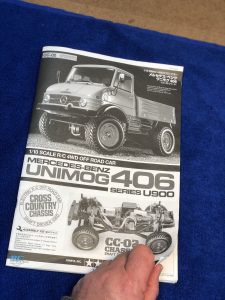
INSTRUCTION MANUAL
You can go into this build with confidence because you are guided by an exceptional instruction manual…this is just one of the great things that Tamiya is known for. Each step list the hardware needed for that step and there is a schematic that is the actual size of the hardware. This allows you to check and make sure you have the correct screw or bolt for the step you are on. There is also plenty of notes for the assembly steps that require extra attention. As long as you closely follow the manual, you will end up with a properly assembled CC-01 with Mercedes-Benz Unimog 406 Series U900 body.
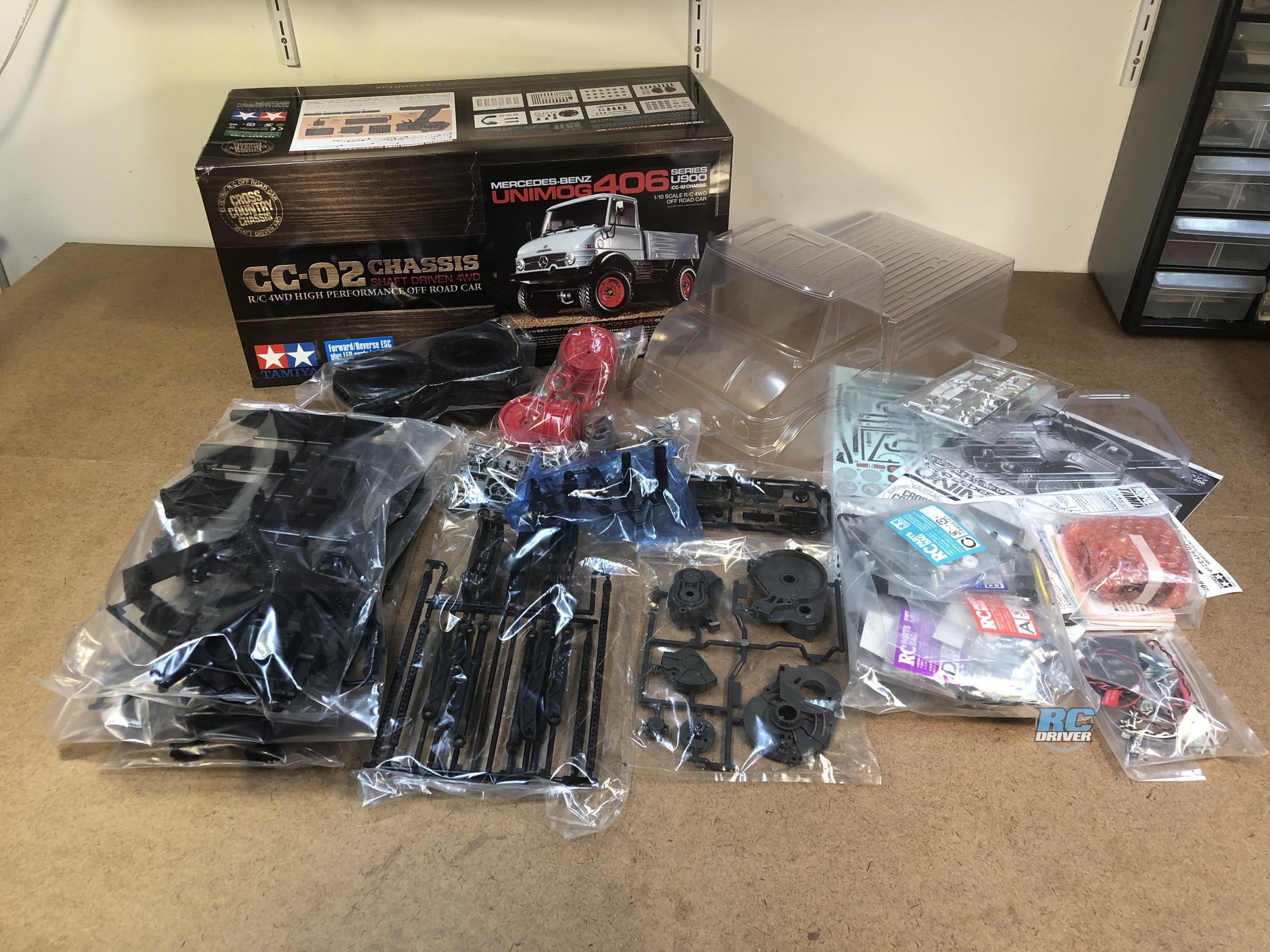
GETTING STARTED
Before we get started with the first step, we unpack all of the parts trees and small parts bags and organize them. Tamiya takes the time to clearly label all the parts trees and small bags of accessories/hardware, which keeps the building process smooth. A pit towel makes a great surface to build on to keep small parts from bouncing off the bench.
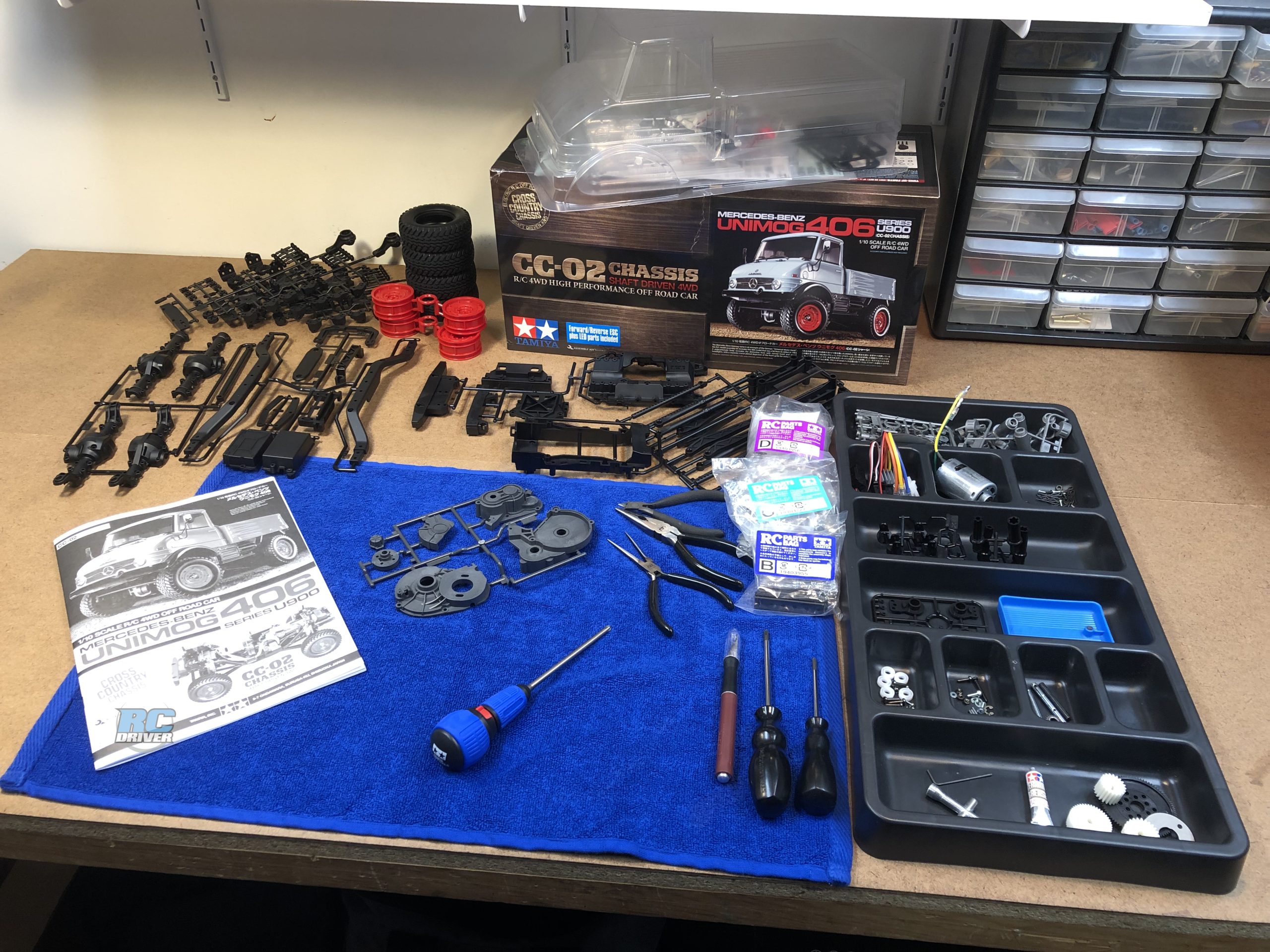
TRANSMISSION
Assembling the transmission is the first part of the build and if you are considering an upgrade to all metal ball bearings, it makes sense to do it now. Tamiya includes plastic and metal bushings for the entire kit and they are fine to use if you are not ready to upgrade the CC-02. We decided to pick up a complete rubber sealed bearing kit from FastEddy Bearings. The kit includes every single bearing you need to replace the stock bushings.
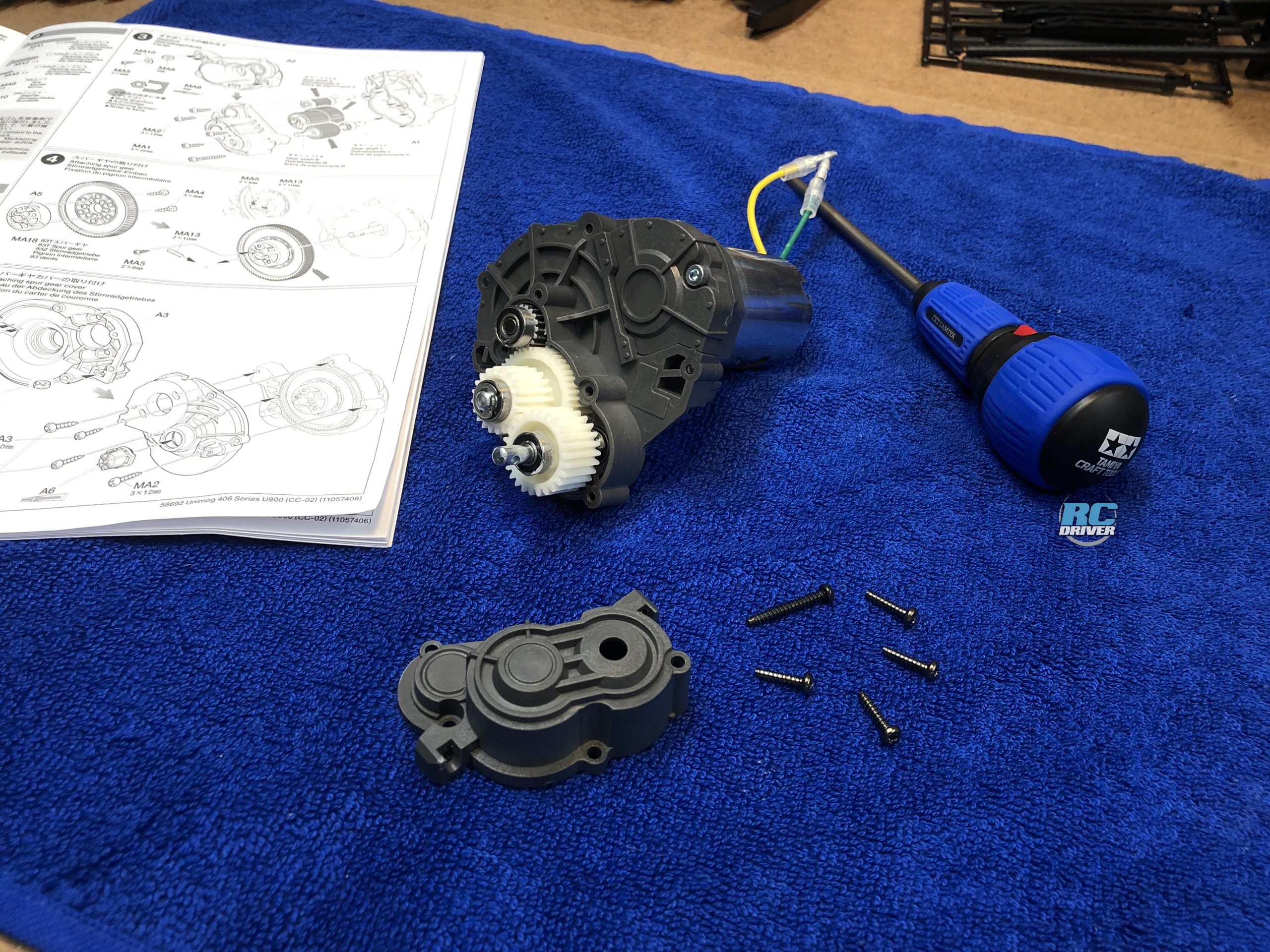
A cool feature that Tamiya designed into the CC-02 is that you have the option of building the transmission two different ways. One way is the standard or high speed gear ratio or you can swap the way the gears are placed inside the gearbox to get a low speed gear ratio.
CHASSIS
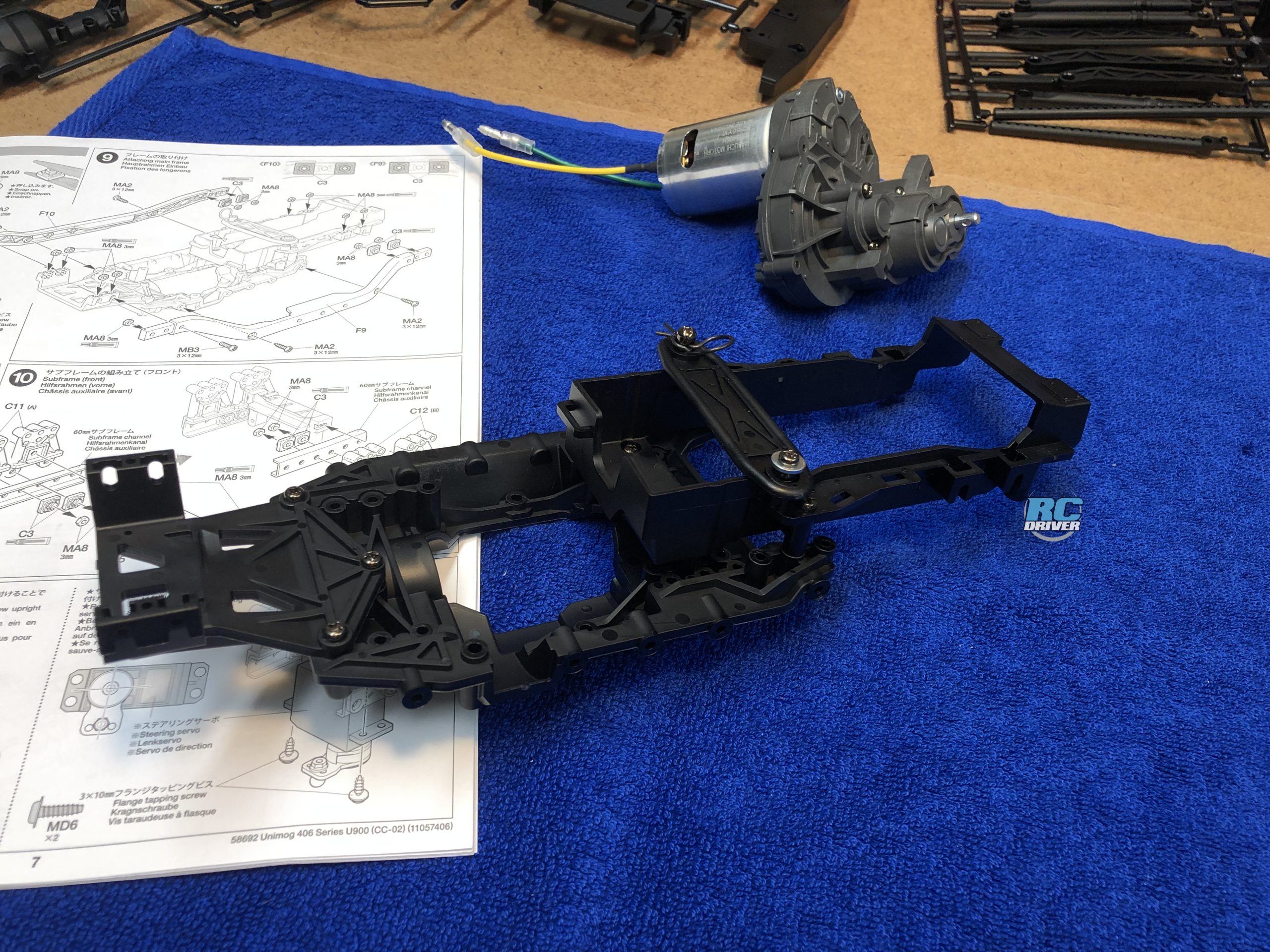
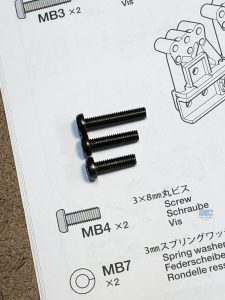
The chassis is composed of several different parts and starts off with the center cradle to which the rest of the parts are attached. The majority of the chassis is made from FRP (Fiber Reinforced Plastic) including the side rails. Only the ends of the rails are made of aluminum and are used to secure the shock and body posts mounts. The overall size of the CC-02 chassis is smaller than other 1/10-scale crawlers. This allows Tamiya to stay as scale as possible thus allowing the use of the many realistic off-road bodies that Tamiya offers.
The battery case or box that is mounted at the rear of the CC-02 chassis will not have a problem accommodating LiPo or NiMh battery packs. Battery can be inserted from the top and held in place with a plastic bar held with a body clip or it can be slid in from the rear. A flex plate in the rear can be bent down to allow the rear bumper to slide off the chassis. Then you can slide the battery into place and reinstall the bumper.
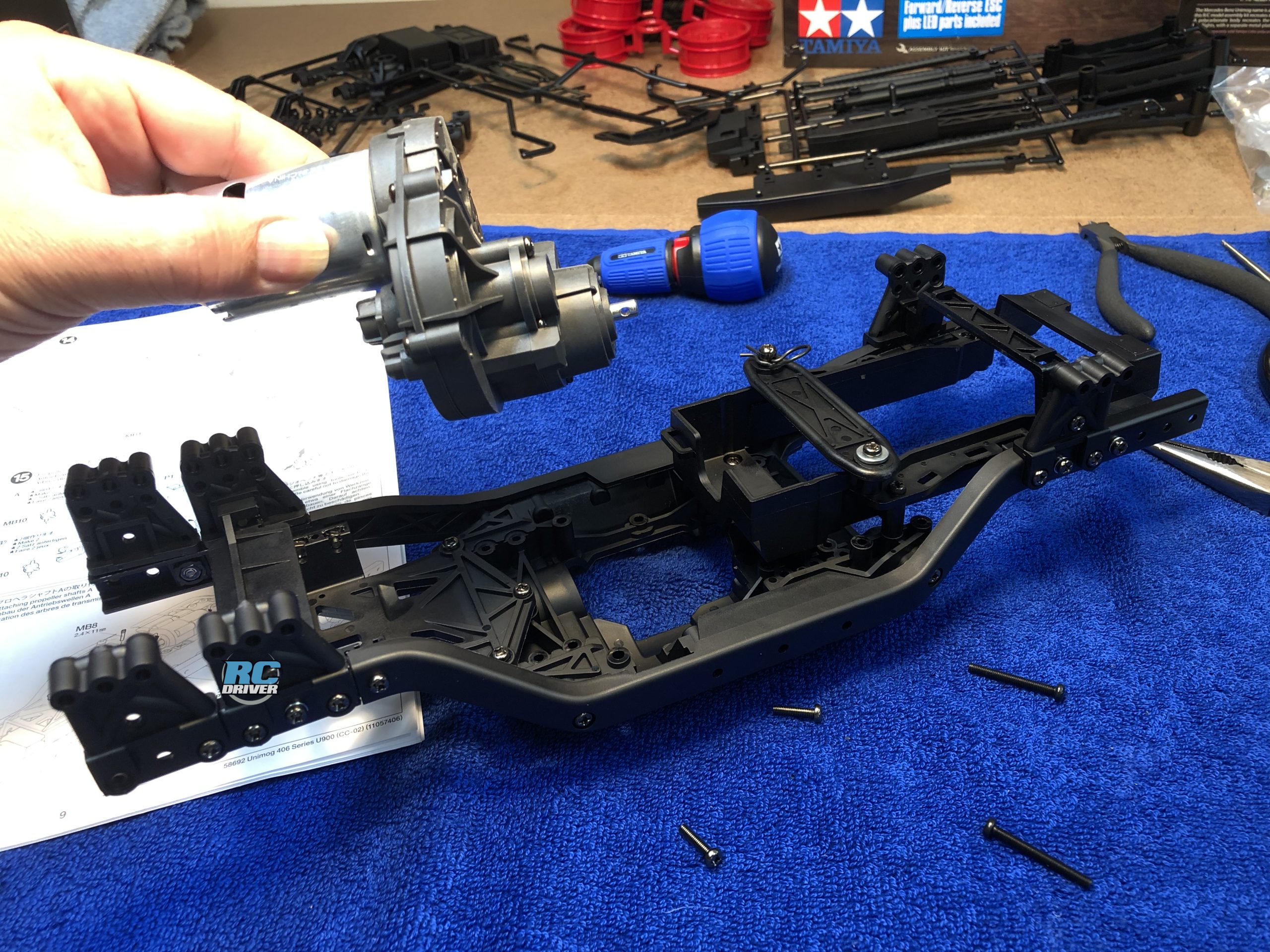
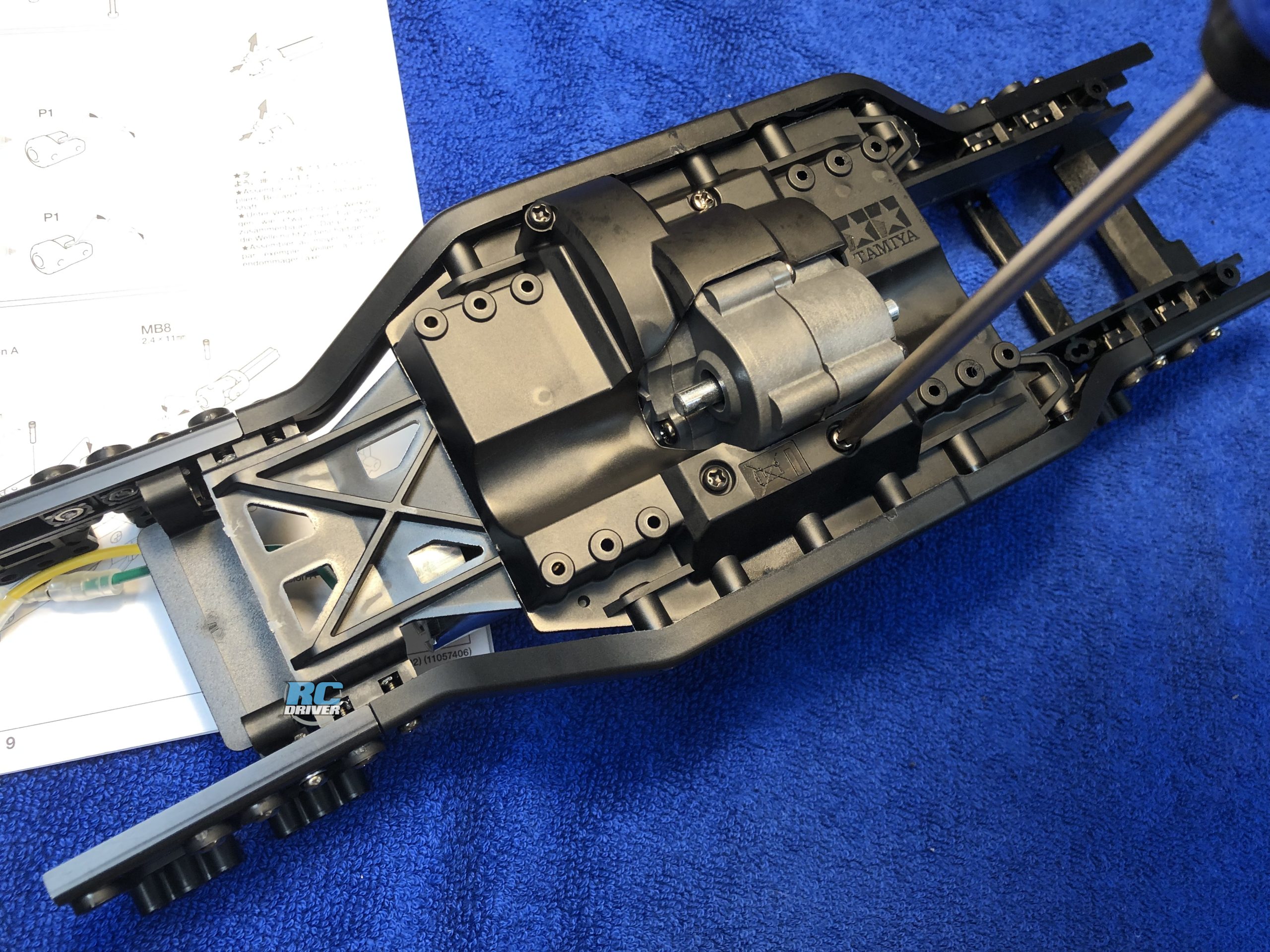
DRIVETRAIN
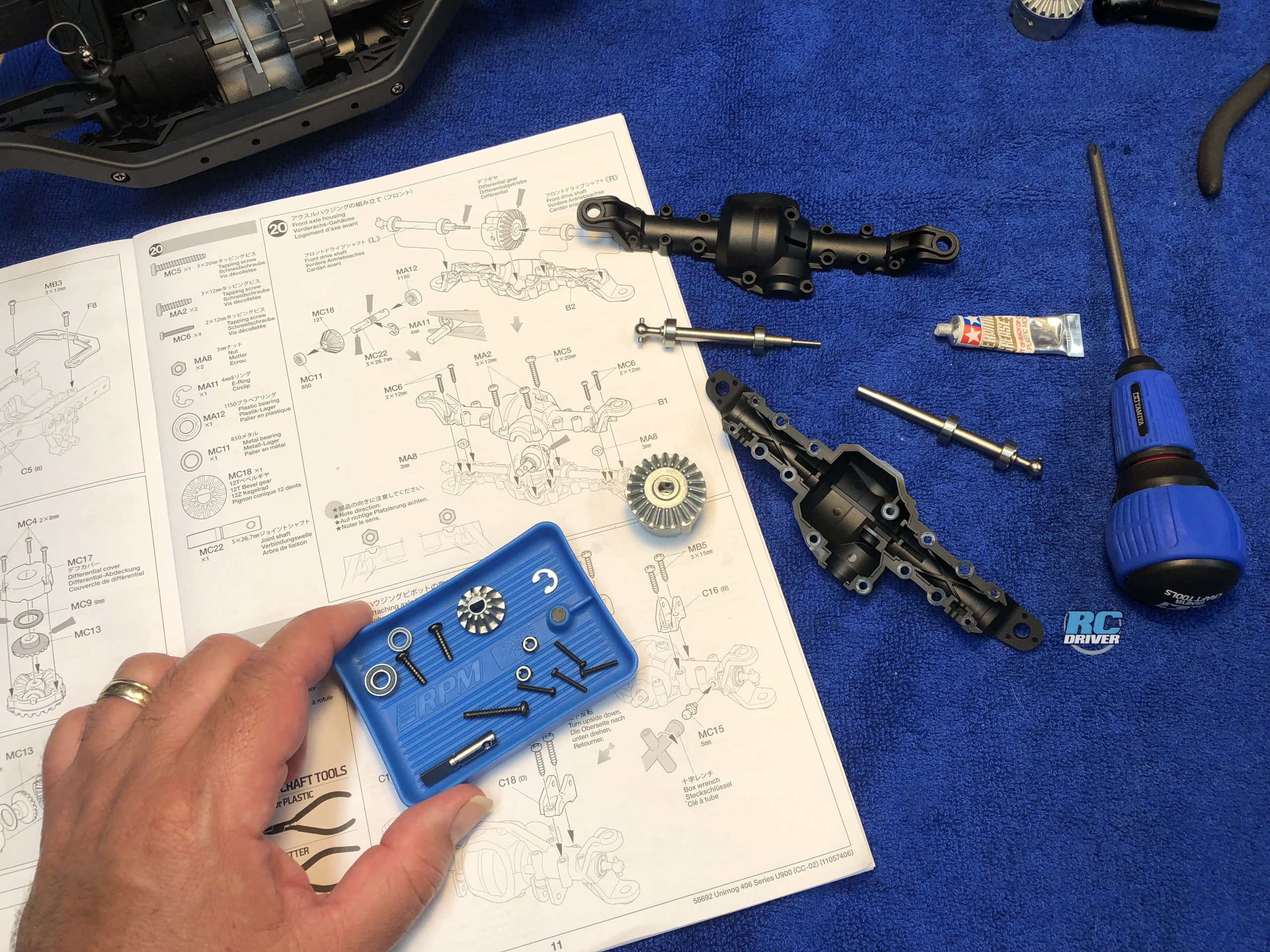
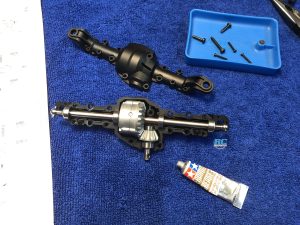
Tamiya employs solid axles for the front and rear of the CC-02 chassis. They are nicely molded from plastic and the front axle has the C-hubs integrated into the axle housing. Inside is nothing but metal components including the steel drive shafts, metal diff housings and diff gears. Here, Tamiya give you the option of building the differentials locked or unlocked. We decided to lock the rear axle and leave the front open.
Pay close attention to the orientation in which you install the tiny 3mm nuts into the side of the axle housings. If they are not oriented correctly, the two halves of the housing will not fit together correctly and there will be a gap between them.
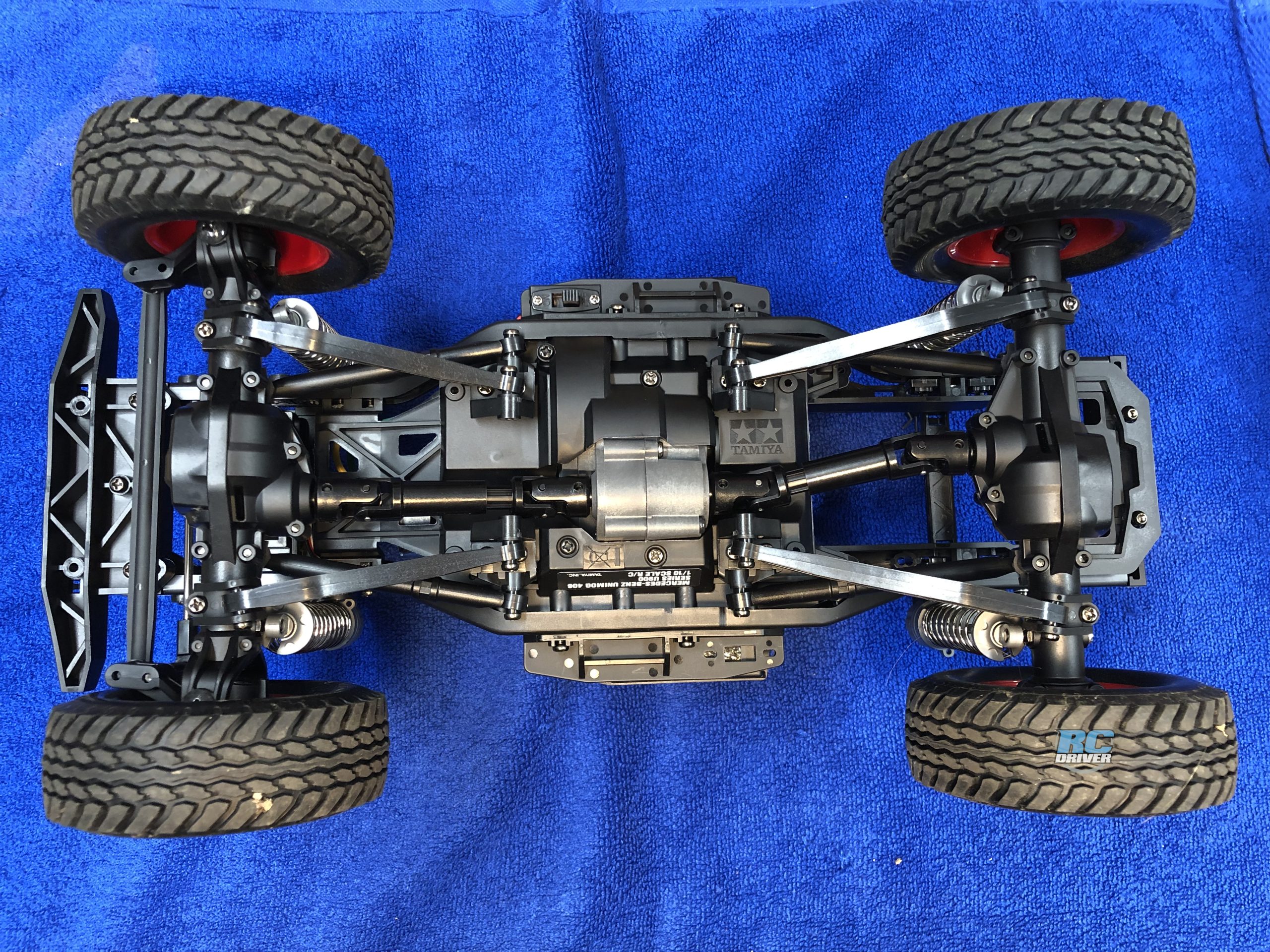
WHEELS & TIRES
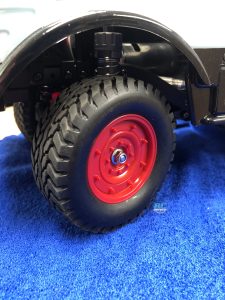
Tamiya included the same block pattern, street style rubber tires on this Mercedes-Benz Unimog 406 Series U900 as the other CC-02 trucks and even the CC-01 trucks. They are quite firm and will last for a very long time and the price of being subpar when it comes to traction when off-roading. We really wish that Tamiya would include better tires for vehicles like the CC-02 which was clearly built for off-road use. A good set of tires would make the performance much better for the Unimog.
The block pattern tires get installed onto realistic looking one-piece ABS plastic wheels which have been molded in red. Although they are rather utilitarian in appearance, they match what you would see being used on 1:1 Unimog trucks.
SUSPENSION
For the suspension, the CC-02 uses a 4-link setup for the front and rear and uses plastic for the material. The bottom links are a trailing arm type and the uppers are rod style links. A clever feature Tamiya added is the method to which the links are attached to the axles. Instead of having the mounting points for the suspension links molded directly onto the axle housing, Tamiya uses separate pivot mounts. This is great in case one of them breaks because then you don’t have to worry about replacing the entire axle housing, just the link mount.
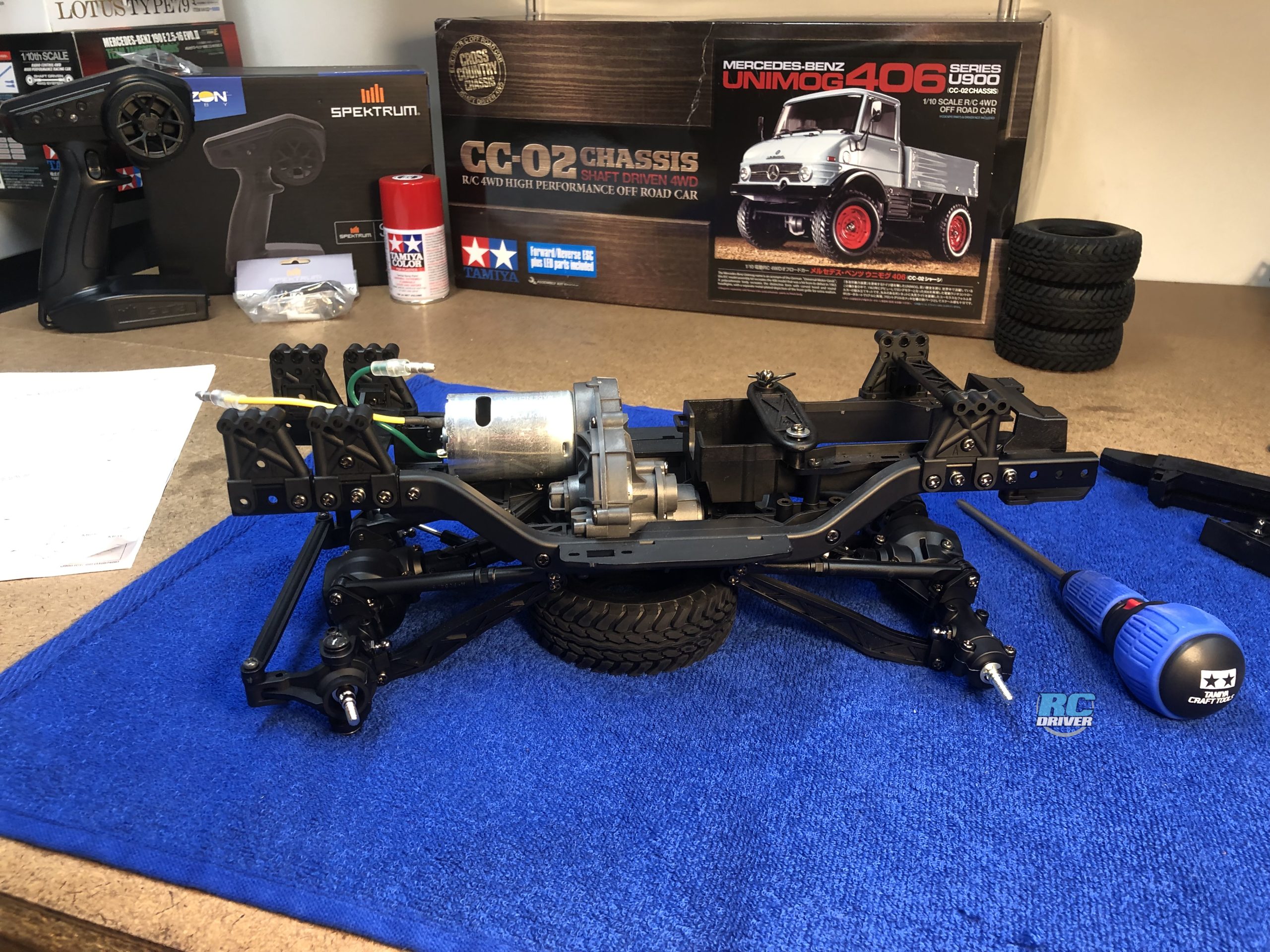
SHOCKS
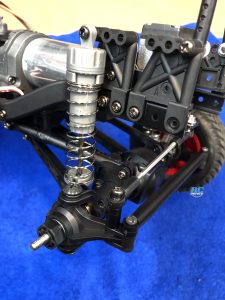
Supporting the suspension are four oil-filled shocks that are molded in gray plastic. Inside of the shock is a steel shock shaft that uses a solid steel plate on top instead of a plastic piston. This speeds up the assembly of the shocks but slightly limits performance and tunability. Silver springs are included and you can adjust preload with spacers. These units are perfect for keeping the Unimog running smoothly over rough terrain and for handling corners at higher speeds.
STEERING
Steering is handled in a pretty conventional way where the steering knuckles are connected to each other with a plastic drag link that sits in front of the axle. Then a metal link is used to connect the right knuckle with the steering servo. Tamiya provides a servo saver for the CC-02 and includes parts to work with nearly any servo brand.
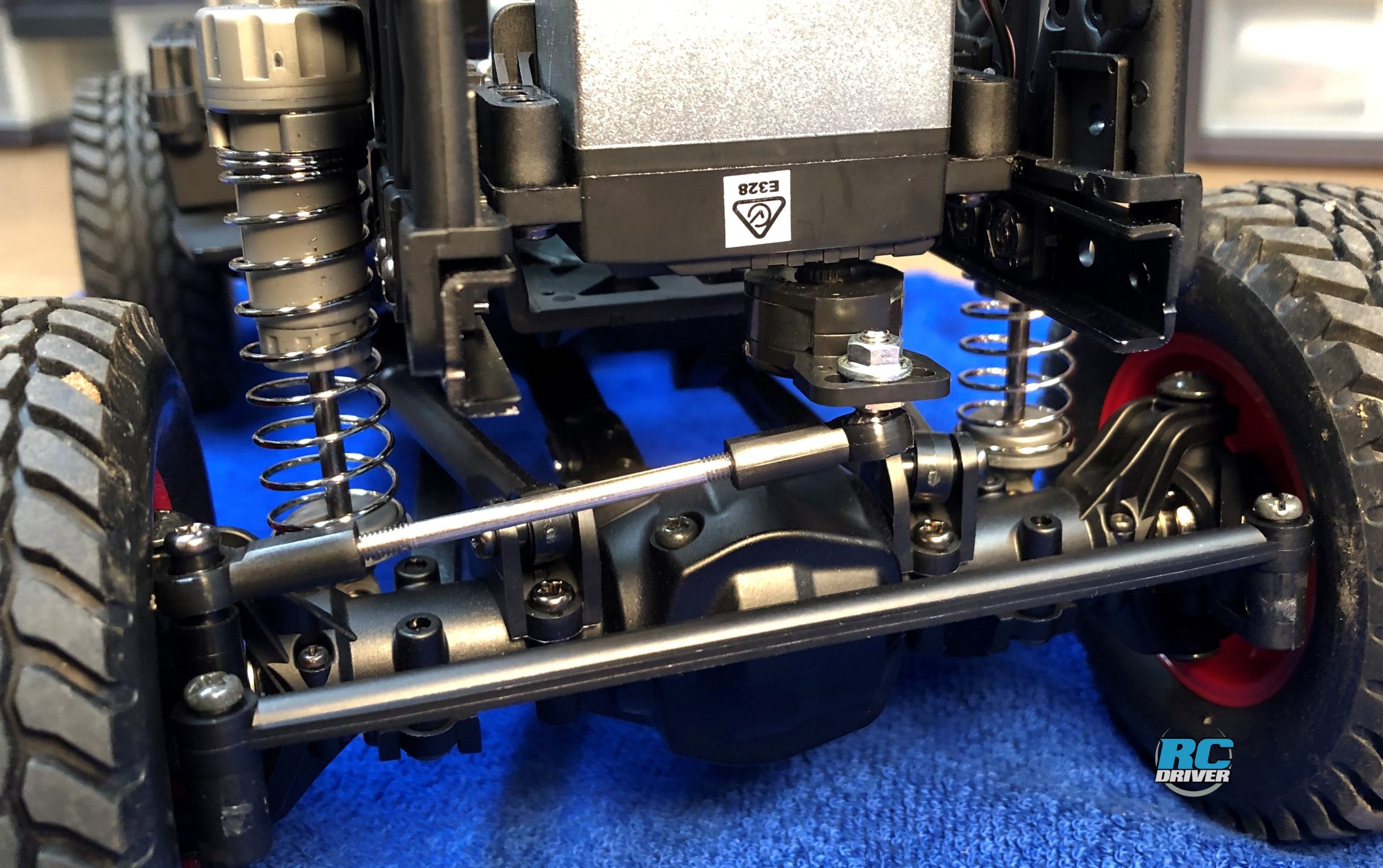
Servo placement is on the chassis between the frame rails. Tamiya designed this setup so that you can mount the servo either lying flat or vertically. For the Spektrum servo we were using, we first tried the stock placement where the servo lies horizontal. Due to the height of the servo, this position did not work because the bottom of the servo was jammed up against the wire leads on the motor. Instead we mounted the servo upside down vertically. This was a quick and easy change and the steering worked flawlessly.
ELECTRONICS
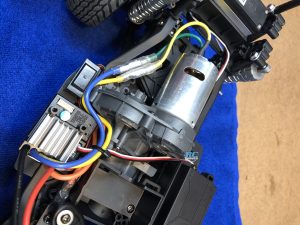
Attached to the gearbox is a Tamiya silver can 540 Mabuchi brushed motor. It comes prewired with bullet connectors so that it simply plugs directly into the electronic speed control (ESC), so no soldering required. These motors are proven to run very well and last as long as they are taken care of and not abused. Controlling the motor is a Tamiya TBLE-04S speed control that has the capability of powering either brushed motors 25-turns and over or sensored brushless motors 21.5-turns and higher. It comes completely wired for simple plug and play action.
BODY
The Tamiya Mercedes-Benz Unimog 406 Series U900 kit includes a highly detailed clear polycarbonate body and it needs to be painted. (If painting is not your thing, there is also another version of the Unimog CC-02 Tamiya offers where the body comes out of the box pre-painted for you—item #47465.) In typical Tamiya fashion, this body is an incredibly accurate representation of the full size Unimog 406 truck where they faithfully recreated this 1/10-scale version. It is composed of the main body and two separate polycarbonate parts that make up the side fuel tanks and fender guards.
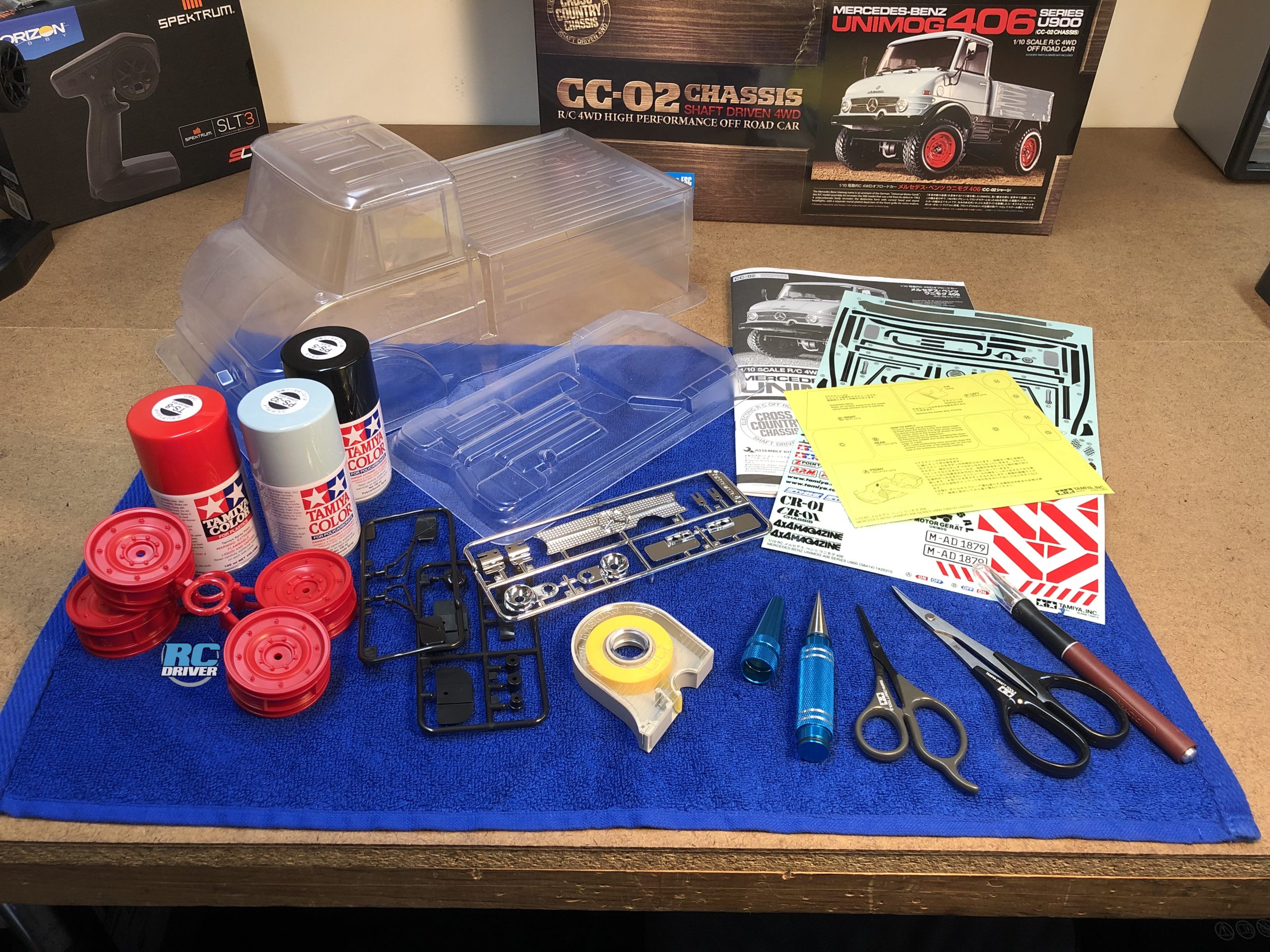
Tamiya provides window masks to help make the painting step easier. Normally you would need to cut each window mask for each window, although in this kit Tamiya precut them for you. At first we thought this was a great idea until we used them. They are perfectly cut and easily come off the backing. The problem is not having the backing on the mask when you go to place it on the body because it makes it very hard to accurately position it on the body. The mask would roll into a tube and you can’t help to avoid getting your fingers on the sticky side of the mask.
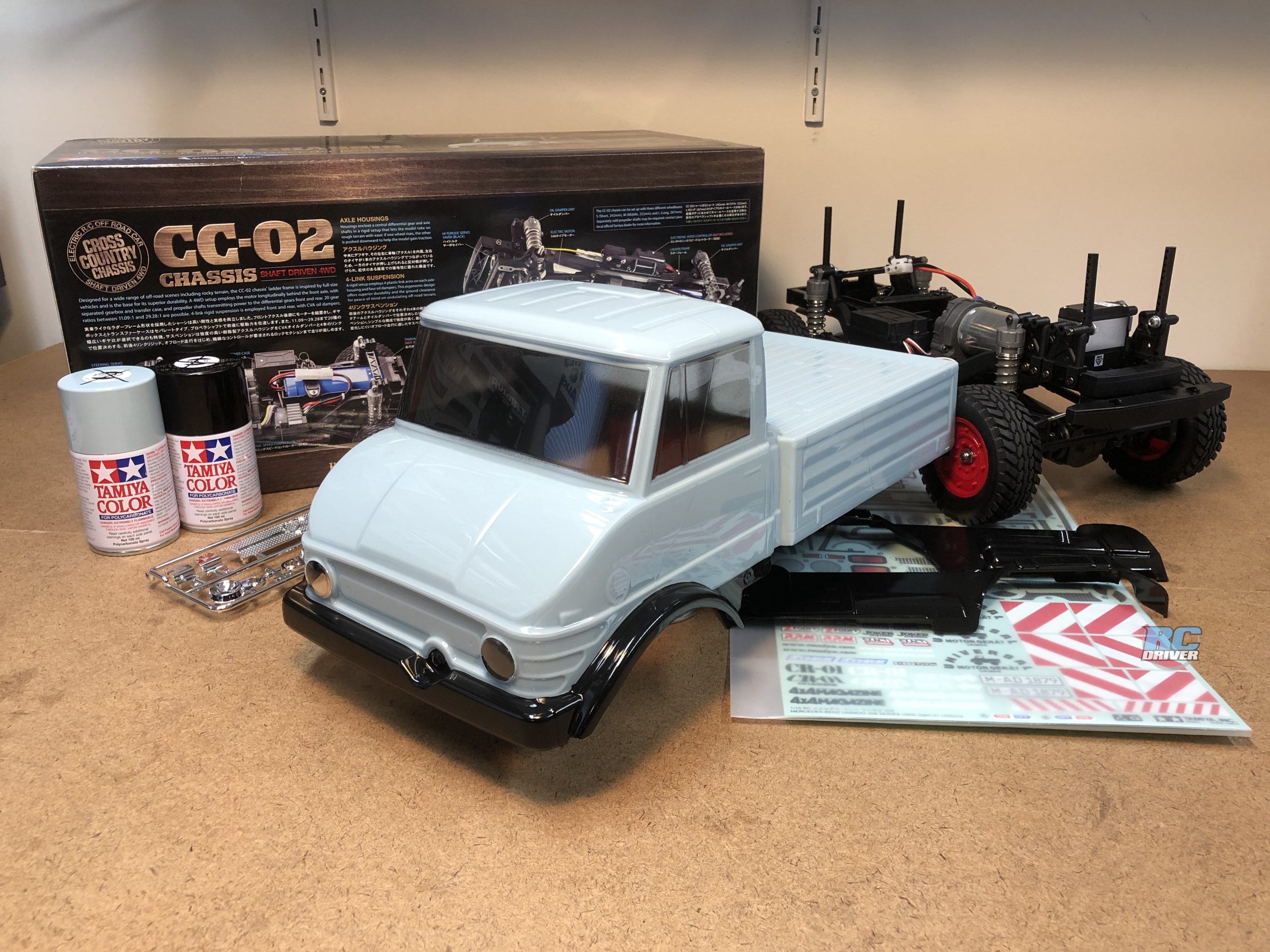
Very nice quality stickers help to bring the Unimog 406 to life. The majority of the stickers are thin black detail stickers that can be very time consuming to place yet are so very worth the effort to achieve an incredibly looking finished product.
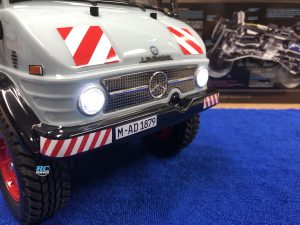
Take your time, cut as much of the clear sticker material away as possible and completely burnish the edges to ensure good adhesion. For any stickers that don’t lay smoothly on the body or you feel are not sticking well enough, use a hairdryer to activate the adhesives and get the sticker to lay totally flat.
Extra detail pieces are included for added realism and are molded in ABS plastic. Items like the side view mirrors and the top of the air intake are molded in black ABS where the front grill and headlight housings are shiny chrome. An added perk with this kit is the inclusion of an LED light kit to not only add function, but also more scale looking. A Tamiya TLU-01 light unit with LEDs to illuminate the front headlights and rear brake lights and metal wire hangers make up the lighting kit. If you want to add more LEDs to the Unimog 406 body, the TLU-01 light can accommodate several more LEDs. Follow the Tamiya instructions and you end up with a nice neat installation where the wires are not visible when driving the CC-02 around.
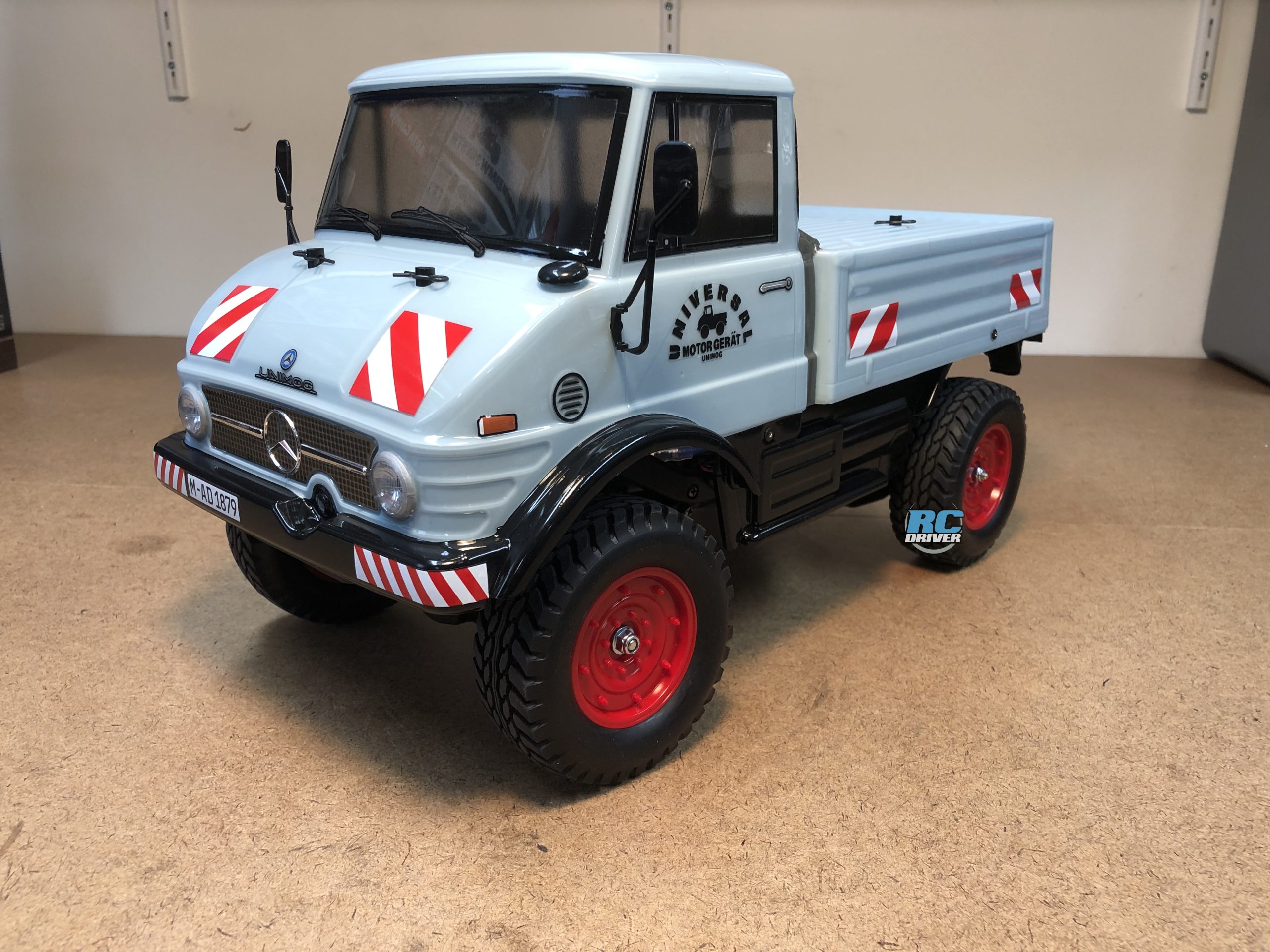
SPECS
- Item no: 58692
- Scale: 1/10
- Type: Build-up kit
- Length: 15.12 in. (384mm)
- Width: 7.72 in. (196mm)
- Height: 8.82 in. (224mm)
- Wheelbase: 9.53 in. (242mm)
- Chassis: Ladder frame
- Drivetrain: Enclosed 4WD w/ center gearbox and transfer case
- Differential: Bevel gear diffs w/ optional locking parts included
- Bearings: Metal and plastic bushings
- Suspension: Plastic 4-link
- Shocks: Molded plastic, oil-filled shocks
- Motor: 540-brushed type
- Speed control: Tamiya TBLE-04S electronic speed control
- Wheels: One-piece red ABS scale wheels
- Tires: Block pattern, street style rubber tires
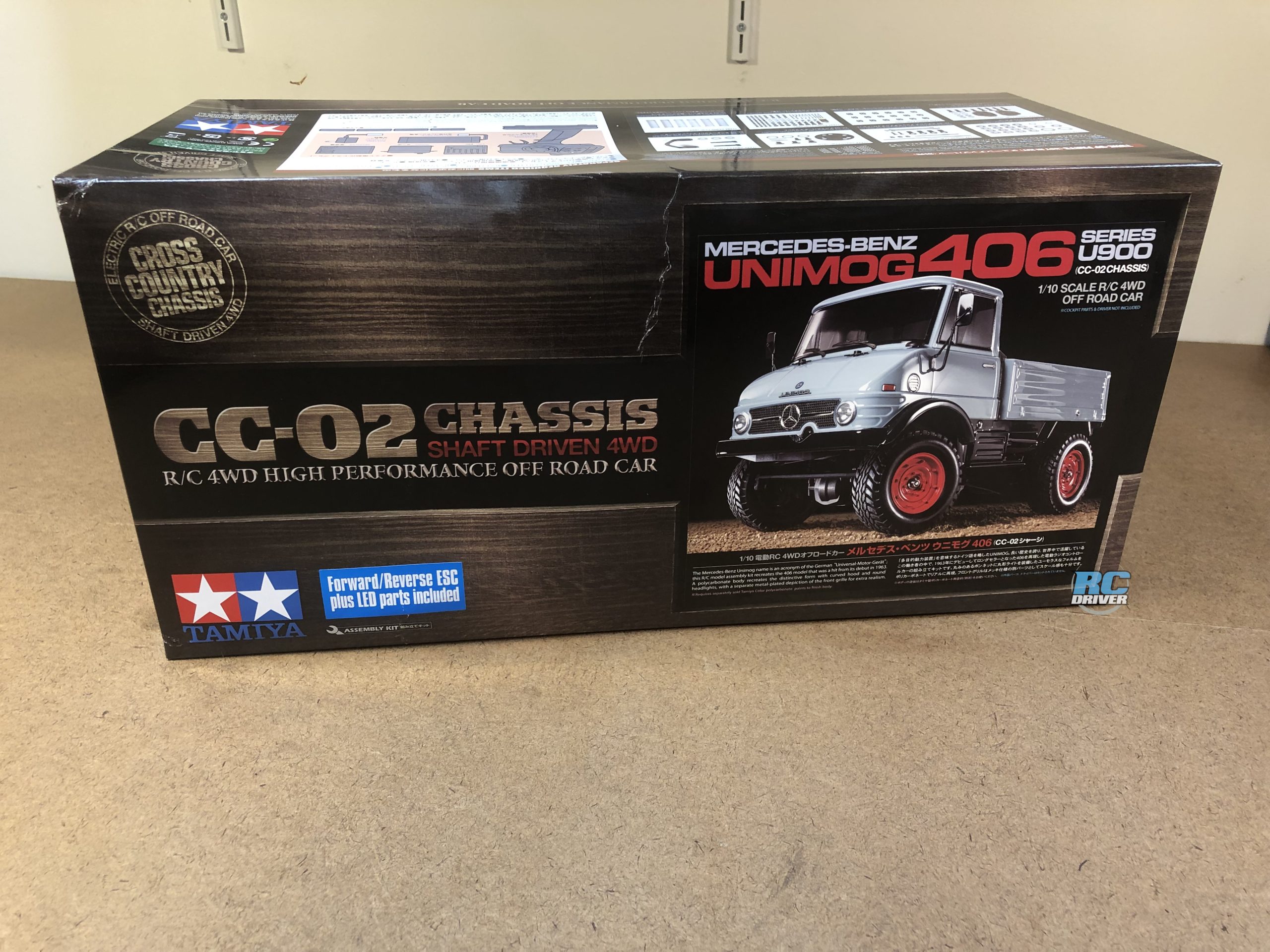
REQUIRED TO COMPLETE
- 2-channel radio system
- Steering servo
- Battery pack
- Battery charger
- Paint for polycarbonate & plastic
BEHIND THE WHEEL
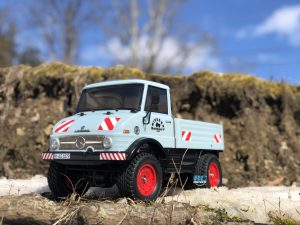 Once the body was completed and mounted on the CC-02 chassis, we could not wait to get this Tamiya Mercedes-Benz Unimog 406 out onto the trails. The scale details that Tamiya incorporated into this kit definitely make this truck very realistic looking and the performance adjustments they built into the chassis can nicely compliment how you would expect a real Unimog would operate. As mentioned earlier, the transmission can be built with the standard gear ratio or with a low speed ratio. We built our CC-02 with the low speed ratio since we planned to run a lot of trails and do some mild crawling where higher speeds are not necessary, but more torque would be a welcome benefit. The other option you have during the build is in the drivetrain where you can build the differentials normally or have them locked. This rig was setup with a locked rear diff and the front diff open because we figured it would be best for where and how this rig was going to be driven.
Once the body was completed and mounted on the CC-02 chassis, we could not wait to get this Tamiya Mercedes-Benz Unimog 406 out onto the trails. The scale details that Tamiya incorporated into this kit definitely make this truck very realistic looking and the performance adjustments they built into the chassis can nicely compliment how you would expect a real Unimog would operate. As mentioned earlier, the transmission can be built with the standard gear ratio or with a low speed ratio. We built our CC-02 with the low speed ratio since we planned to run a lot of trails and do some mild crawling where higher speeds are not necessary, but more torque would be a welcome benefit. The other option you have during the build is in the drivetrain where you can build the differentials normally or have them locked. This rig was setup with a locked rear diff and the front diff open because we figured it would be best for where and how this rig was going to be driven. 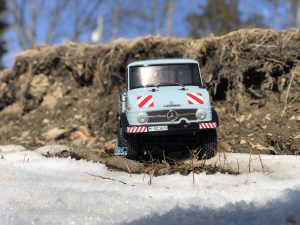 Generally, the Unimog performed very well where the open front diff allowed it to still have a fairly tight turning radius and the locked rear gave the necessary forward traction to climb and get over obstacles. This combined with the lower speed ratio in the tranny was a great match so you could have nice controlled ascents up hills and over off-road terrain. When the standard gearing is used, it speeds up the truck considerably and we felt that this did not suit the scale Unimog body riding on the chassis and when on the trails, it was just too fast.
Generally, the Unimog performed very well where the open front diff allowed it to still have a fairly tight turning radius and the locked rear gave the necessary forward traction to climb and get over obstacles. This combined with the lower speed ratio in the tranny was a great match so you could have nice controlled ascents up hills and over off-road terrain. When the standard gearing is used, it speeds up the truck considerably and we felt that this did not suit the scale Unimog body riding on the chassis and when on the trails, it was just too fast.
The Tamiya TBLE-04S electronic speed control is a good universal ESC for most applications and beginners. It is able to run either brushed or brushless motors, gives you forward and reverse control and there is some adjustability built into it. 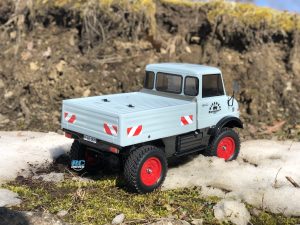 For the Unimog it is not ideal if you plan to run the truck more like a trail/crawler and not bomb around with it. During those low speed crawls, it would not offer smooth power output and is kind of jittery. There is also no drag bake when running a brushed motor like what is included with this CC-02. Drag brake is key for making smooth and controlled descents. Now if you swap out the 540 brushed motor and drop in a brushless motor, you can then access the drag brake settings on the TBLE-04S ESC.
For the Unimog it is not ideal if you plan to run the truck more like a trail/crawler and not bomb around with it. During those low speed crawls, it would not offer smooth power output and is kind of jittery. There is also no drag bake when running a brushed motor like what is included with this CC-02. Drag brake is key for making smooth and controlled descents. Now if you swap out the 540 brushed motor and drop in a brushless motor, you can then access the drag brake settings on the TBLE-04S ESC.
You have to keep in mind that this is not a hardcore rock crawler and is really more of a trail truck. The CC in the name of the chassis stands for Cross Country and that tells you right out of the gate the type of terrain this truck was meant to be driven on. Additionally, the scale tires and wheels the Unimog runs is considerably smaller than say an Axial SCX10 crawler. Once you consider that, the Unimog does perform appropriately especially if you scale down the terrain to match what this truck was designed to conquer.
It would be nice if Tamiya did not spec the street style tires for the Unimog and included some true off-road rubber because the stock tires are certainly limiting its capabilities. In regards to the suspension and off-road handling, the Unimog was completely fine at a slower pace. It is when you run the high speed gears and tear around with it that you see it bouncing around a bit. We also found that it was pretty stable with a low enough center of gravity that we could climb some steep smooth rock formations. For more information about Tamiya products, visit: TAMIYA
For more information about Tamiya products, visit: TAMIYA
 RC Driver The Best In RC Car & Truck News, Reviews & Video
RC Driver The Best In RC Car & Truck News, Reviews & Video 


